- java.lang.Object
-
- io.reactivex.rxjava3.core.Completable
-
- All Implemented Interfaces:
- CompletableSource
- Direct Known Subclasses:
- CompletableSubject
public abstract class Completable extends Object implements CompletableSource
TheCompletableclass represents a deferred computation without any value but only indication for completion or exception.Completablebehaves similarly toObservableexcept that it can only emit either a completion or error signal (there is noonNextoronSuccessas with the other reactive types).The
Completableclass implements theCompletableSourcebase interface and the default consumer type it interacts with is theCompletableObservervia thesubscribe(CompletableObserver)method. TheCompletableoperates with the following sequential protocol:onSubscribe (onError | onComplete)?Note that as with the
Observableprotocol,onErrorandonCompleteare mutually exclusive events.Like
Observable, a runningCompletablecan be stopped through theDisposableinstance provided to consumers throughSingleObserver.onSubscribe(io.reactivex.rxjava3.disposables.Disposable).Like an
Observable, aCompletableis lazy, can be either "hot" or "cold", synchronous or asynchronous.Completableinstances returned by the methods of this class are cold and there is a standard hot implementation in the form of a subject:CompletableSubject.The documentation for this class makes use of marble diagrams. The following legend explains these diagrams:
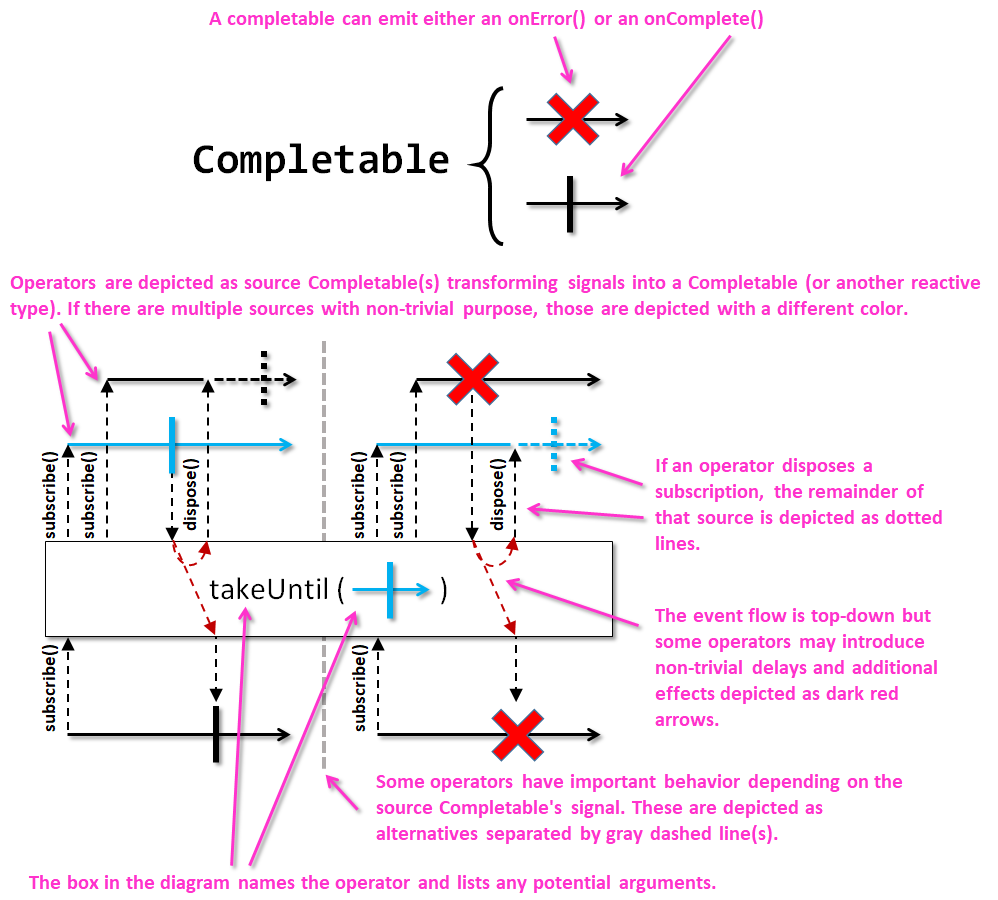
See
FlowableorObservablefor the implementation of the Reactive Pattern for a stream or vector of values.Example:
Disposable d = Completable.complete() .delay(10, TimeUnit.SECONDS, Schedulers.io()) .subscribeWith(new DisposableCompletableObserver() { @Override public void onStart() { System.out.println("Started"); } @Override public void onError(Throwable error) { error.printStackTrace(); } @Override public void onComplete() { System.out.println("Done!"); } }); Thread.sleep(5000); d.dispose();Note that by design, subscriptions via
subscribe(CompletableObserver)can't be disposed from the outside (hence thevoidreturn of thesubscribe(CompletableObserver)method) and it is the responsibility of the implementor of theCompletableObserverto allow this to happen. RxJava supports such usage with the standardDisposableCompletableObserverinstance. For convenience, thesubscribeWith(CompletableObserver)method is provided as well to allow working with aCompletableObserver(or subclass) instance to be applied with in a fluent manner (such as in the example above).- See Also:
DisposableCompletableObserver
-
-
Constructor Summary
Constructors Constructor and Description Completable()
-
Method Summary
All Methods Static Methods Instance Methods Abstract Methods Concrete Methods Modifier and Type Method and Description static @NonNull Completableamb(@NonNull Iterable<? extends CompletableSource> sources)Returns a Completable which terminates as soon as one of the source Completables terminates (normally or with an error) and disposes all other Completables.static @NonNull CompletableambArray(CompletableSource... sources)Returns a Completable which terminates as soon as one of the source Completables terminates (normally or with an error) and disposes all other Completables.@NonNull CompletableambWith(@NonNull CompletableSource other)Returns a Completable that emits the a terminated event of either this Completable or the other Completable whichever fires first.@NonNull CompletableandThen(@NonNull CompletableSource next)Returns a Completable that first runs this Completable and then the other completable.<T> @NonNull Maybe<T>andThen(@NonNull MaybeSource<T> next)Returns aMaybewhich will subscribe to this Completable and once that is completed then will subscribe to thenextMaybeSource.<T> @NonNull Observable<T>andThen(@NonNull ObservableSource<T> next)Returns an Observable which will subscribe to this Completable and once that is completed then will subscribe to thenextObservableSource.<T> @NonNull Flowable<T>andThen(@NonNull Publisher<T> next)Returns a Flowable which will subscribe to this Completable and once that is completed then will subscribe to thenextFlowable.<T> @NonNull Single<T>andThen(@NonNull SingleSource<T> next)Returns a Single which will subscribe to this Completable and once that is completed then will subscribe to thenextSingleSource.voidblockingAwait()Subscribes to and awaits the termination of this Completable instance in a blocking manner and rethrows any exception emitted.booleanblockingAwait(long timeout, @NonNull TimeUnit unit)Subscribes to and awaits the termination of this Completable instance in a blocking manner with a specific timeout and rethrows any exception emitted within the timeout window.@NonNull Completablecache()Subscribes to this Completable only once, when the first CompletableObserver subscribes to the result Completable, caches its terminal event and relays/replays it to observers.static @NonNull Completablecomplete()Returns a Completable instance that completes immediately when subscribed to.@NonNull Completablecompose(@NonNull CompletableTransformer transformer)Calls the given transformer function with this instance and returns the function's resulting Completable.static @NonNull Completableconcat(@NonNull Iterable<? extends CompletableSource> sources)Returns a Completable which completes only when all sources complete, one after another.static @NonNull Completableconcat(@NonNull Publisher<? extends CompletableSource> sources)Returns a Completable which completes only when all sources complete, one after another.static @NonNull Completableconcat(@NonNull Publisher<? extends CompletableSource> sources, int prefetch)Returns a Completable which completes only when all sources complete, one after another.static @NonNull CompletableconcatArray(CompletableSource... sources)Returns a Completable which completes only when all sources complete, one after another.@NonNull CompletableconcatWith(@NonNull CompletableSource other)Concatenates this Completable with another Completable.static @NonNull Completablecreate(@NonNull CompletableOnSubscribe source)Provides an API (via a cold Completable) that bridges the reactive world with the callback-style world.static @NonNull Completabledefer(@NonNull Supplier<? extends CompletableSource> completableSupplier)Defers the subscription to a Completable instance returned by a supplier.@NonNull Completabledelay(long delay, @NonNull TimeUnit unit)Returns a Completable which delays the emission of the completion event by the given time.@NonNull Completabledelay(long delay, @NonNull TimeUnit unit, @NonNull Scheduler scheduler)Returns a Completable which delays the emission of the completion event by the given time while running on the specified scheduler.@NonNull Completabledelay(long delay, @NonNull TimeUnit unit, @NonNull Scheduler scheduler, boolean delayError)Returns a Completable which delays the emission of the completion event, and optionally the error as well, by the given time while running on the specified scheduler.@NonNull CompletabledelaySubscription(long delay, @NonNull TimeUnit unit)Returns a Completable that delays the subscription to the source CompletableSource by a given amount of time.@NonNull CompletabledelaySubscription(long delay, @NonNull TimeUnit unit, @NonNull Scheduler scheduler)Returns a Completable that delays the subscription to the source CompletableSource by a given amount of time, both waiting and subscribing on a given Scheduler.@NonNull CompletabledoAfterTerminate(@NonNull Action onAfterTerminate)Returns a Completable instance that calls the given onTerminate callback after this Completable completes normally or with an exception.@NonNull CompletabledoFinally(@NonNull Action onFinally)Calls the specified action after this Completable signals onError or onComplete or gets disposed by the downstream.@NonNull CompletabledoOnComplete(@NonNull Action onComplete)Returns a Completable which calls the given onComplete callback if this Completable completes.@NonNull CompletabledoOnDispose(@NonNull Action onDispose)Calls the sharedActionif a CompletableObserver subscribed to the current Completable disposes the common Disposable it received via onSubscribe.@NonNull CompletabledoOnError(@NonNull Consumer<? super Throwable> onError)Returns a Completable which calls the given onError callback if this Completable emits an error.@NonNull CompletabledoOnEvent(@NonNull Consumer<? super Throwable> onEvent)Returns a Completable which calls the given onEvent callback with the (throwable) for an onError or (null) for an onComplete signal from this Completable before delivering said signal to the downstream.@NonNull CompletabledoOnSubscribe(@NonNull Consumer<? super Disposable> onSubscribe)Returns a Completable instance that calls the given onSubscribe callback with the disposable that child subscribers receive on subscription.@NonNull CompletabledoOnTerminate(@NonNull Action onTerminate)Returns a Completable instance that calls the given onTerminate callback just before this Completable completes normally or with an exception.static @NonNull Completableerror(@NonNull Supplier<? extends Throwable> errorSupplier)Creates a Completable which calls the given error supplier for each subscriber and emits its returned Throwable.static @NonNull Completableerror(@NonNull Throwable error)Creates a Completable instance that emits the given Throwable exception to subscribers.static @NonNull CompletablefromAction(@NonNull Action run)Returns a Completable instance that runs the given Action for each subscriber and emits either an unchecked exception or simply completes.static @NonNull CompletablefromCallable(@NonNull Callable<?> callable)Returns a Completable which when subscribed, executes the callable function, ignores its normal result and emits onError or onComplete only.static @NonNull CompletablefromCompletionStage(@NonNull CompletionStage<?> stage)Signals completion (or error) when theCompletionStageterminates.static @NonNull CompletablefromFuture(@NonNull Future<?> future)Returns a Completable instance that reacts to the termination of the given Future in a blocking fashion.static <T> @NonNull CompletablefromMaybe(@NonNull MaybeSource<T> maybe)Returns a Completable instance that when subscribed to, subscribes to theMaybeinstance and emits a completion event if the maybe emitsonSuccess/onCompleteor forwards anyonErrorevents.static <T> @NonNull CompletablefromObservable(@NonNull ObservableSource<T> observable)Returns a Completable instance that subscribes to the given Observable, ignores all values and emits only the terminal event.static <T> @NonNull CompletablefromPublisher(@NonNull Publisher<T> publisher)Returns a Completable instance that subscribes to the given publisher, ignores all values and emits only the terminal event.static @NonNull CompletablefromRunnable(@NonNull Runnable run)Returns a Completable instance that runs the given Runnable for each subscriber and emits either its exception or simply completes.static <T> @NonNull CompletablefromSingle(@NonNull SingleSource<T> single)Returns a Completable instance that when subscribed to, subscribes to the Single instance and emits a completion event if the single emits onSuccess or forwards any onError events.static @NonNull CompletablefromSupplier(@NonNull Supplier<?> supplier)Returns a Completable which when subscribed, executes the supplier function, ignores its normal result and emits onError or onComplete only.@NonNull Completablehide()Hides the identity of this Completable and its Disposable.@NonNull Completablelift(@NonNull CompletableOperator onLift)This method requires advanced knowledge about building operators, please consider other standard composition methods first; Returns aCompletablewhich, when subscribed to, invokes theapply(CompletableObserver)method of the providedCompletableOperatorfor each individual downstreamCompletableand allows the insertion of a custom operator by accessing the downstream'sCompletableObserverduring this subscription phase and providing a newCompletableObserver, containing the custom operator's intended business logic, that will be used in the subscription process going further upstream.<T> @NonNull Single<Notification<T>>materialize()Maps the signal types of this Completable into aNotificationof the same kind and emits it as a single success value to downstream.static @NonNull Completablemerge(@NonNull Iterable<? extends CompletableSource> sources)Returns a Completable instance that subscribes to all sources at once and completes only when all source Completables complete or one of them emits an error.static @NonNull Completablemerge(@NonNull Publisher<? extends CompletableSource> sources)Returns a Completable instance that subscribes to all sources at once and completes only when all source Completables complete or one of them emits an error.static @NonNull Completablemerge(@NonNull Publisher<? extends CompletableSource> sources, int maxConcurrency)Returns a Completable instance that keeps subscriptions to a limited number of sources at once and completes only when all source Completables complete or one of them emits an error.static @NonNull CompletablemergeArray(CompletableSource... sources)Returns a Completable instance that subscribes to all sources at once and completes only when all source Completables complete or one of them emits an error.static @NonNull CompletablemergeArrayDelayError(CompletableSource... sources)Returns a CompletableConsumable that subscribes to all Completables in the source array and delays any error emitted by either the sources observable or any of the inner Completables until all of them terminate in a way or another.static @NonNull CompletablemergeDelayError(@NonNull Iterable<? extends CompletableSource> sources)Returns a Completable that subscribes to all Completables in the source sequence and delays any error emitted by either the sources observable or any of the inner Completables until all of them terminate in a way or another.static @NonNull CompletablemergeDelayError(@NonNull Publisher<? extends CompletableSource> sources)Returns a Completable that subscribes to all Completables in the source sequence and delays any error emitted by either the sources observable or any of the inner Completables until all of them terminate in a way or another.static @NonNull CompletablemergeDelayError(@NonNull Publisher<? extends CompletableSource> sources, int maxConcurrency)Returns a Completable that subscribes to a limited number of inner Completables at once in the source sequence and delays any error emitted by either the sources observable or any of the inner Completables until all of them terminate in a way or another.@NonNull CompletablemergeWith(@NonNull CompletableSource other)Returns a Completable which subscribes to this and the other Completable and completes when both of them complete or one emits an error.static @NonNull Completablenever()Returns a Completable that never calls onError or onComplete.@NonNull CompletableobserveOn(@NonNull Scheduler scheduler)Returns a Completable which emits the terminal events from the thread of the specified scheduler.@NonNull CompletableonErrorComplete()Returns a Completable instance that if this Completable emits an error, it will emit an onComplete and swallow the throwable.@NonNull CompletableonErrorComplete(@NonNull Predicate<? super Throwable> predicate)Returns a Completable instance that if this Completable emits an error and the predicate returns true, it will emit an onComplete and swallow the throwable.@NonNull CompletableonErrorResumeNext(@NonNull Function<? super Throwable,? extends CompletableSource> errorMapper)Returns a Completable instance that when encounters an error from this Completable, calls the specified mapper function that returns another Completable instance for it and resumes the execution with it.@NonNull CompletableonTerminateDetach()Nulls out references to the upstream producer and downstream CompletableObserver if the sequence is terminated or downstream calls dispose().@NonNull Completablerepeat()Returns a Completable that repeatedly subscribes to this Completable until disposed.@NonNull Completablerepeat(long times)Returns a Completable that subscribes repeatedly at most the given times to this Completable.@NonNull CompletablerepeatUntil(@NonNull BooleanSupplier stop)Returns a Completable that repeatedly subscribes to this Completable so long as the given stop supplier returns false.@NonNull CompletablerepeatWhen(@NonNull Function<? super Flowable<Object>,? extends Publisher<?>> handler)Returns a Completable instance that repeats when the Publisher returned by the handler emits an item or completes when this Publisher emits a completed event.@NonNull Completableretry()Returns a Completable that retries this Completable as long as it emits an onError event.@NonNull Completableretry(@NonNull BiPredicate<? super Integer,? super Throwable> predicate)Returns a Completable that retries this Completable in case of an error as long as the predicate returns true.@NonNull Completableretry(long times)Returns a Completable that when this Completable emits an error, retries at most the given number of times before giving up and emitting the last error.@NonNull Completableretry(long times, @NonNull Predicate<? super Throwable> predicate)Returns a Completable that when this Completable emits an error, retries at most times or until the predicate returns false, whichever happens first and emitting the last error.@NonNull Completableretry(@NonNull Predicate<? super Throwable> predicate)Returns a Completable that when this Completable emits an error, calls the given predicate with the latest exception to decide whether to resubscribe to this or not.@NonNull CompletableretryWhen(@NonNull Function<? super Flowable<Throwable>,? extends Publisher<?>> handler)Returns a Completable which given a Publisher and when this Completable emits an error, delivers that error through a Flowable and the Publisher should signal a value indicating a retry in response or a terminal event indicating a termination.@NonNull CompletablestartWith(@NonNull CompletableSource other)Returns a Completable which first runs the other Completable then this completable if the other completed normally.<T> @NonNull Observable<T>startWith(@NonNull ObservableSource<T> other)Returns an Observable which first delivers the events of the other Observable then runs this CompletableConsumable.<T> @NonNull Flowable<T>startWith(@NonNull Publisher<T> other)Returns a Flowable which first delivers the events of the other Publisher then runs this Completable.@NonNull Disposablesubscribe()Subscribes to this CompletableConsumable and returns a Disposable which can be used to dispose the subscription.@NonNull Disposablesubscribe(@NonNull Action onComplete)Subscribes to this Completable and calls the given Action when this Completable completes normally.@NonNull Disposablesubscribe(@NonNull Action onComplete, @NonNull Consumer<? super Throwable> onError)Subscribes to this Completable and calls back either the onError or onComplete functions.voidsubscribe(@NonNull CompletableObserver observer)Subscribes the givenCompletableObserverto thisCompletableSourceinstance.protected abstract voidsubscribeActual(@NonNull CompletableObserver observer)Implement this method to handle the incomingCompletableObservers and perform the business logic in your operator.@NonNull CompletablesubscribeOn(@NonNull Scheduler scheduler)Returns a Completable which subscribes the child subscriber on the specified scheduler, making sure the subscription side-effects happen on that specific thread of the scheduler.<E extends CompletableObserver>
EsubscribeWith(E observer)Subscribes a given CompletableObserver (subclass) to this Completable and returns the given CompletableObserver as is.@NonNull CompletabletakeUntil(@NonNull CompletableSource other)Terminates the downstream if this or the otherCompletableterminates (wins the termination race) while disposing the connection to the losing source.@NonNull TestObserver<Void>test()Creates a TestObserver and subscribes it to this Completable.@NonNull TestObserver<Void>test(boolean dispose)Creates a TestObserver optionally in cancelled state, then subscribes it to this Completable.@NonNull Completabletimeout(long timeout, @NonNull TimeUnit unit)Returns a Completable that runs this Completable and emits a TimeoutException in case this Completable doesn't complete within the given time.@NonNull Completabletimeout(long timeout, @NonNull TimeUnit unit, @NonNull CompletableSource other)Returns a Completable that runs this Completable and switches to the other Completable in case this Completable doesn't complete within the given time.@NonNull Completabletimeout(long timeout, @NonNull TimeUnit unit, @NonNull Scheduler scheduler)Returns a Completable that runs this Completable and emits a TimeoutException in case this Completable doesn't complete within the given time while "waiting" on the specified Scheduler.@NonNull Completabletimeout(long timeout, @NonNull TimeUnit unit, @NonNull Scheduler scheduler, @NonNull CompletableSource other)Returns a Completable that runs this Completable and switches to the other Completable in case this Completable doesn't complete within the given time while "waiting" on the specified scheduler.static @NonNull Completabletimer(long delay, @NonNull TimeUnit unit)Returns a Completable instance that fires its onComplete event after the given delay elapsed.static @NonNull Completabletimer(long delay, @NonNull TimeUnit unit, @NonNull Scheduler scheduler)Returns a Completable instance that fires its onComplete event after the given delay elapsed by using the supplied scheduler.<R> Rto(@NonNull CompletableConverter<? extends R> converter)Calls the specified converter function during assembly time and returns its resulting value.<T> @NonNull CompletionStage<T>toCompletionStage(T defaultItem)Signals the given default item when the upstream completes or signals the upstream error via aCompletionStage.<T> @NonNull Flowable<T>toFlowable()Returns a Flowable which when subscribed to subscribes to this Completable and relays the terminal events to the subscriber.<T> @NonNull Maybe<T>toMaybe()Converts this Completable into aMaybe.<T> @NonNull Observable<T>toObservable()Returns an Observable which when subscribed to subscribes to this Completable and relays the terminal events to the subscriber.<T> @NonNull Single<T>toSingle(@NonNull Supplier<? extends T> completionValueSupplier)Converts this Completable into a Single which when this Completable completes normally, calls the given supplier and emits its returned value through onSuccess.<T> @NonNull Single<T>toSingleDefault(T completionValue)Converts this Completable into a Single which when this Completable completes normally, emits the given value through onSuccess.static @NonNull CompletableunsafeCreate(@NonNull CompletableSource source)Constructs a Completable instance by wrapping the given source callback without any safeguards; you should manage the lifecycle and response to downstream disposal.@NonNull CompletableunsubscribeOn(@NonNull Scheduler scheduler)Returns a Completable which makes sure when a subscriber disposes the subscription, the dispose is called on the specified scheduler.static <R> @NonNull Completableusing(@NonNull Supplier<R> resourceSupplier, @NonNull Function<? super R,? extends CompletableSource> completableFunction, @NonNull Consumer<? super R> disposer)Returns a Completable instance which manages a resource along with a custom Completable instance while the subscription is active.static <R> @NonNull Completableusing(@NonNull Supplier<R> resourceSupplier, @NonNull Function<? super R,? extends CompletableSource> completableFunction, @NonNull Consumer<? super R> disposer, boolean eager)Returns a Completable instance which manages a resource along with a custom Completable instance while the subscription is active and performs eager or lazy resource disposition.static @NonNull Completablewrap(@NonNull CompletableSource source)Wraps the given CompletableSource into a Completable if not already Completable.
-
-
-
Method Detail
-
ambArray
@CheckReturnValue @NonNull @SchedulerSupport(value="none") @SafeVarargs public static @NonNull Completable ambArray(@NonNull CompletableSource... sources)
Returns a Completable which terminates as soon as one of the source Completables terminates (normally or with an error) and disposes all other Completables.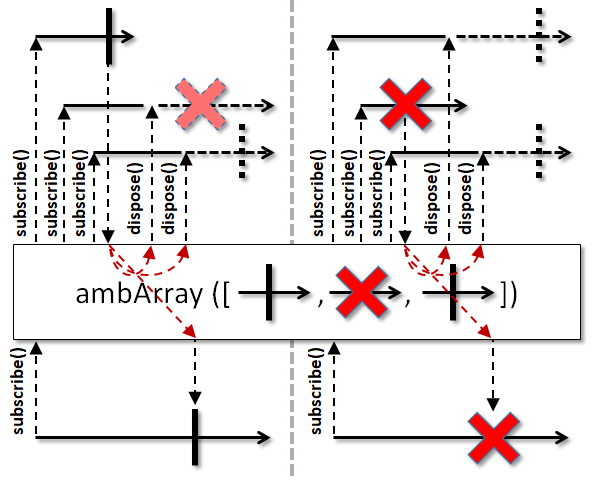
- Scheduler:
ambArraydoes not operate by default on a particularScheduler.
- Parameters:
sources- the array of source Completables. A subscription to each source will occur in the same order as in this array.- Returns:
- the new Completable instance
- Throws:
NullPointerException- if sources is null
-
amb
@CheckReturnValue @NonNull @SchedulerSupport(value="none") public static @NonNull Completable amb(@NonNull @NonNull Iterable<? extends CompletableSource> sources)
Returns a Completable which terminates as soon as one of the source Completables terminates (normally or with an error) and disposes all other Completables.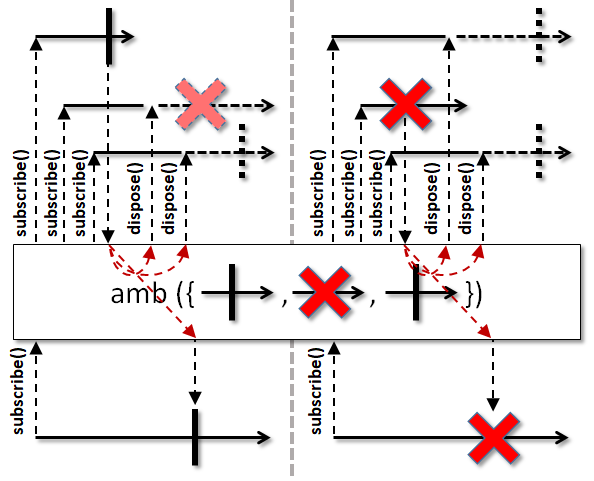
- Scheduler:
ambdoes not operate by default on a particularScheduler.
- Parameters:
sources- the array of source Completables. A subscription to each source will occur in the same order as in this Iterable.- Returns:
- the new Completable instance
- Throws:
NullPointerException- if sources is null
-
complete
@CheckReturnValue @NonNull @SchedulerSupport(value="none") public static @NonNull Completable complete()
Returns a Completable instance that completes immediately when subscribed to.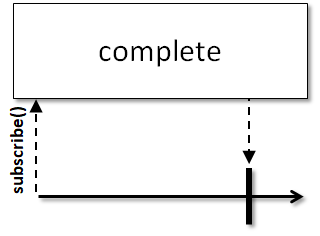
- Scheduler:
completedoes not operate by default on a particularScheduler.
- Returns:
- a Completable instance that completes immediately
-
concatArray
@CheckReturnValue @NonNull @SchedulerSupport(value="none") @SafeVarargs public static @NonNull Completable concatArray(@NonNull CompletableSource... sources)
Returns a Completable which completes only when all sources complete, one after another.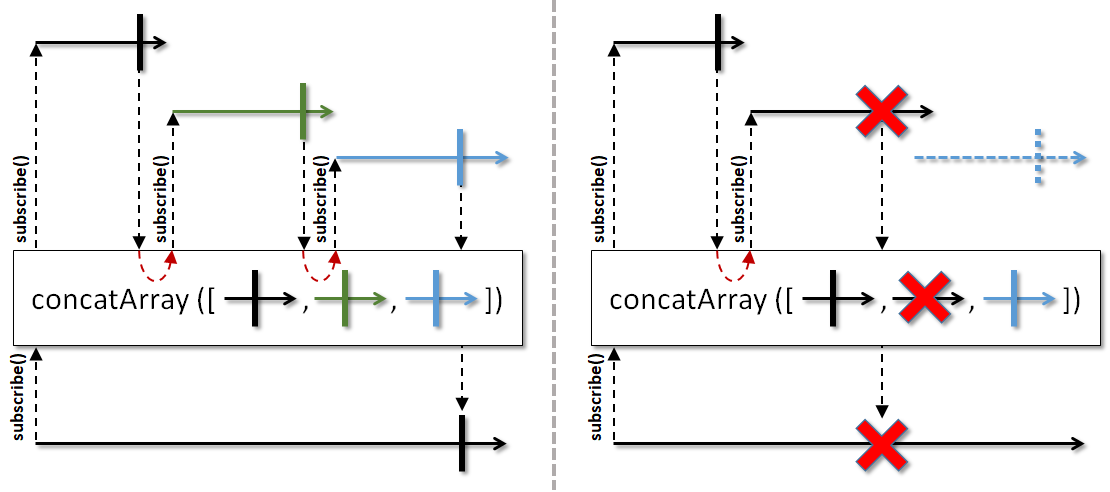
- Scheduler:
concatArraydoes not operate by default on a particularScheduler.
- Parameters:
sources- the sources to concatenate- Returns:
- the Completable instance which completes only when all sources complete
- Throws:
NullPointerException- if sources is null
-
concat
@CheckReturnValue @NonNull @SchedulerSupport(value="none") public static @NonNull Completable concat(@NonNull @NonNull Iterable<? extends CompletableSource> sources)
Returns a Completable which completes only when all sources complete, one after another.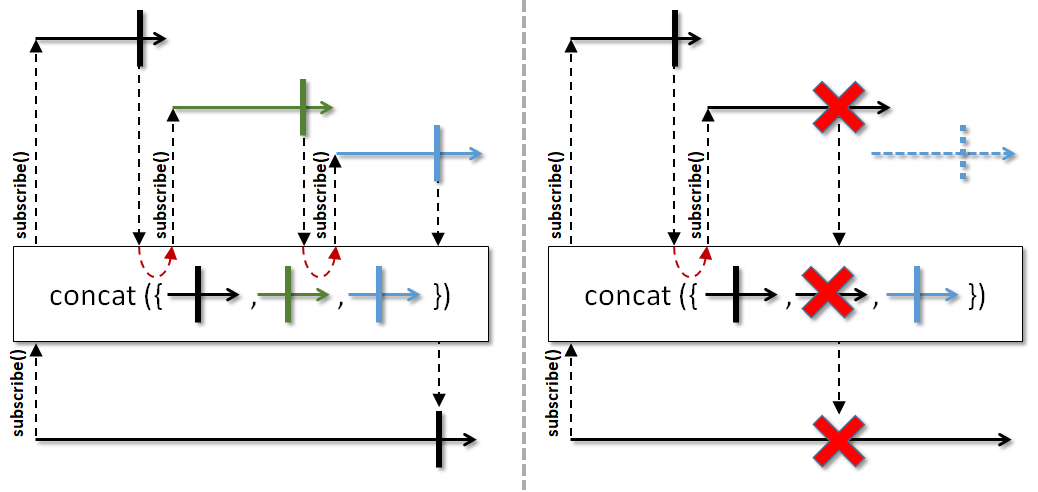
- Scheduler:
concatdoes not operate by default on a particularScheduler.
- Parameters:
sources- the sources to concatenate- Returns:
- the Completable instance which completes only when all sources complete
- Throws:
NullPointerException- if sources is null
-
concat
@CheckReturnValue @SchedulerSupport(value="none") @BackpressureSupport(value=FULL) @NonNull public static @NonNull Completable concat(@NonNull @NonNull Publisher<? extends CompletableSource> sources)
Returns a Completable which completes only when all sources complete, one after another.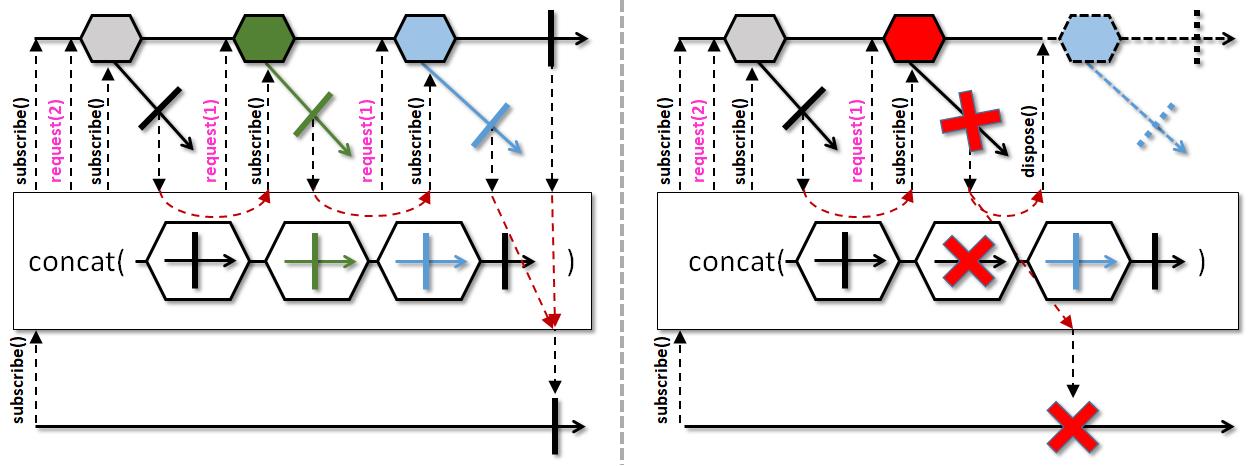
- Backpressure:
- The returned
Completablehonors the backpressure of the downstream consumer and expects the otherPublisherto honor it as well. - Scheduler:
concatdoes not operate by default on a particularScheduler.
- Parameters:
sources- the sources to concatenate- Returns:
- the Completable instance which completes only when all sources complete
- Throws:
NullPointerException- if sources is null
-
concat
@CheckReturnValue @NonNull @SchedulerSupport(value="none") @BackpressureSupport(value=FULL) public static @NonNull Completable concat(@NonNull @NonNull Publisher<? extends CompletableSource> sources, int prefetch)
Returns a Completable which completes only when all sources complete, one after another.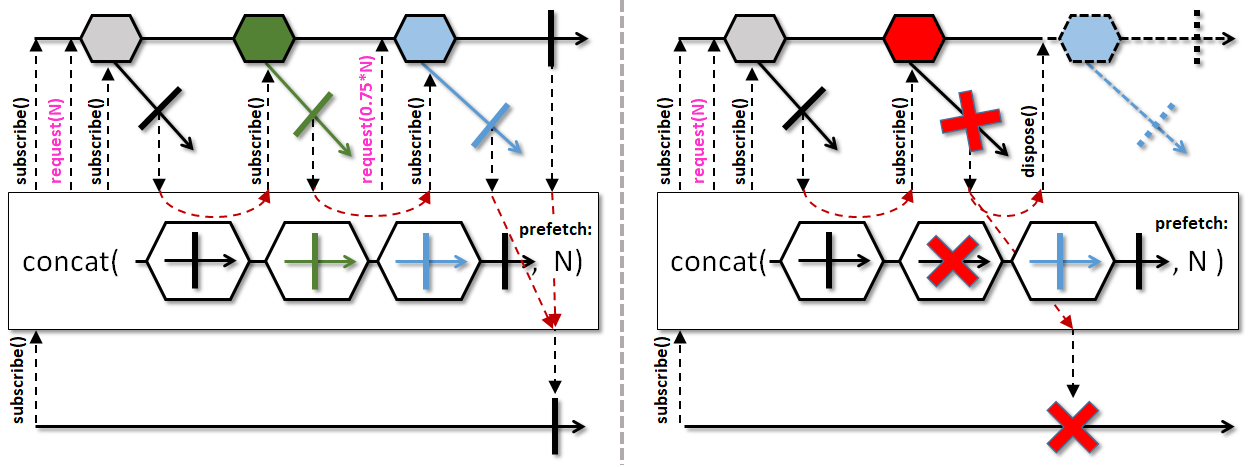
- Backpressure:
- The returned
Completablehonors the backpressure of the downstream consumer and expects the otherPublisherto honor it as well. - Scheduler:
concatdoes not operate by default on a particularScheduler.
- Parameters:
sources- the sources to concatenateprefetch- the number of sources to prefetch from the sources- Returns:
- the Completable instance which completes only when all sources complete
- Throws:
NullPointerException- if sources is null
-
create
@CheckReturnValue @NonNull @SchedulerSupport(value="none") public static @NonNull Completable create(@NonNull @NonNull CompletableOnSubscribe source)
Provides an API (via a cold Completable) that bridges the reactive world with the callback-style world.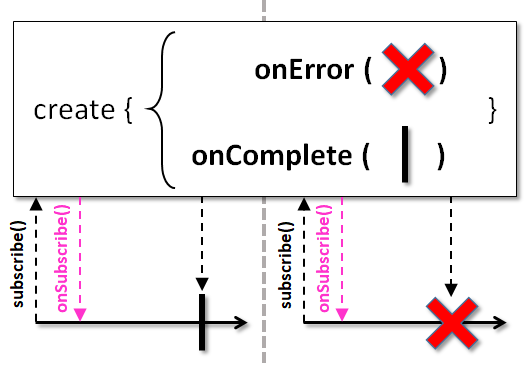
Example:
Completable.create(emitter -> { Callback listener = new Callback() { @Override public void onEvent(Event e) { emitter.onComplete(); } @Override public void onFailure(Exception e) { emitter.onError(e); } }; AutoCloseable c = api.someMethod(listener); emitter.setCancellable(c::close); });Whenever a
CompletableObserversubscribes to the returnedCompletable, the providedCompletableOnSubscribecallback is invoked with a fresh instance of aCompletableEmitterthat will interact only with that specificCompletableObserver. If thisCompletableObserverdisposes the flow (makingCompletableEmitter.isDisposed()return true), other observers subscribed to the same returnedCompletableare not affected.- Scheduler:
createdoes not operate by default on a particularScheduler.
- Parameters:
source- the emitter that is called when a CompletableObserver subscribes to the returnedCompletable- Returns:
- the new Completable instance
- See Also:
CompletableOnSubscribe,Cancellable
-
unsafeCreate
@CheckReturnValue @NonNull @SchedulerSupport(value="none") public static @NonNull Completable unsafeCreate(@NonNull @NonNull CompletableSource source)
Constructs a Completable instance by wrapping the given source callback without any safeguards; you should manage the lifecycle and response to downstream disposal.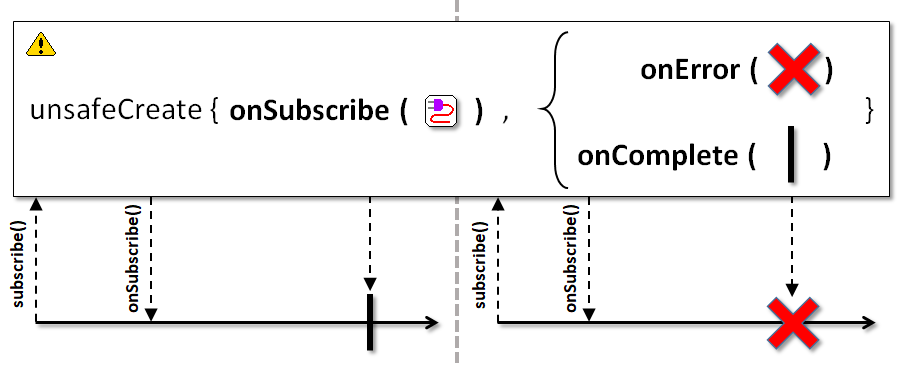
- Scheduler:
unsafeCreatedoes not operate by default on a particularScheduler.
- Parameters:
source- the callback which will receive the CompletableObserver instances when the Completable is subscribed to.- Returns:
- the created Completable instance
- Throws:
NullPointerException- if source is null
-
defer
@CheckReturnValue @NonNull @SchedulerSupport(value="none") public static @NonNull Completable defer(@NonNull @NonNull Supplier<? extends CompletableSource> completableSupplier)
Defers the subscription to a Completable instance returned by a supplier.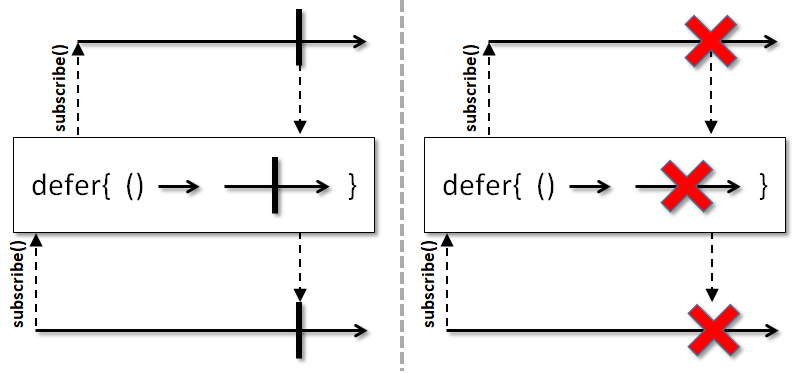
- Scheduler:
deferdoes not operate by default on a particularScheduler.
- Parameters:
completableSupplier- the supplier that returns the Completable that will be subscribed to.- Returns:
- the Completable instance
-
error
@CheckReturnValue @NonNull @SchedulerSupport(value="none") public static @NonNull Completable error(@NonNull @NonNull Supplier<? extends Throwable> errorSupplier)
Creates a Completable which calls the given error supplier for each subscriber and emits its returned Throwable.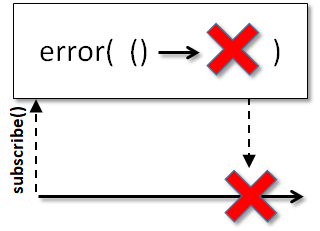
If the errorSupplier returns null, the child CompletableObservers will receive a NullPointerException.
- Scheduler:
errordoes not operate by default on a particularScheduler.
- Parameters:
errorSupplier- the error supplier, not null- Returns:
- the new Completable instance
- Throws:
NullPointerException- if errorSupplier is null
-
error
@CheckReturnValue @NonNull @SchedulerSupport(value="none") public static @NonNull Completable error(@NonNull @NonNull Throwable error)
Creates a Completable instance that emits the given Throwable exception to subscribers.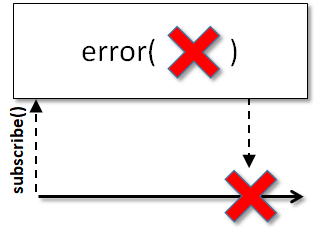
- Scheduler:
errordoes not operate by default on a particularScheduler.
- Parameters:
error- the Throwable instance to emit, not null- Returns:
- the new Completable instance
- Throws:
NullPointerException- if error is null
-
fromAction
@CheckReturnValue @NonNull @SchedulerSupport(value="none") public static @NonNull Completable fromAction(@NonNull @NonNull Action run)
Returns a Completable instance that runs the given Action for each subscriber and emits either an unchecked exception or simply completes.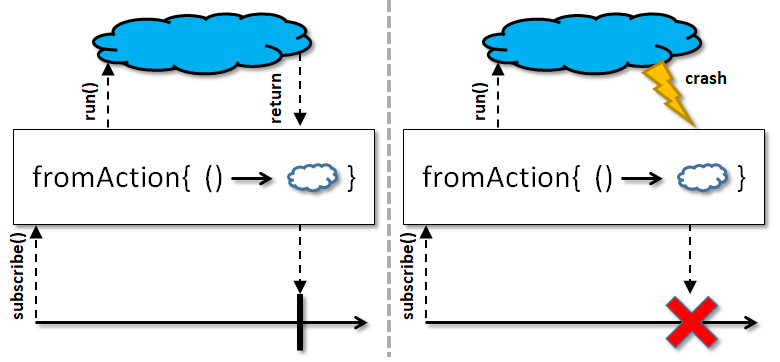
- Scheduler:
fromActiondoes not operate by default on a particularScheduler.- Error handling:
- If the
Actionthrows an exception, the respectiveThrowableis delivered to the downstream viaCompletableObserver.onError(Throwable), except when the downstream has disposed thisCompletablesource. In this latter case, theThrowableis delivered to the global error handler viaRxJavaPlugins.onError(Throwable)as anUndeliverableException.
- Parameters:
run- the runnable to run for each subscriber- Returns:
- the new Completable instance
- Throws:
NullPointerException- if run is null
-
fromCallable
@CheckReturnValue @NonNull @SchedulerSupport(value="none") public static @NonNull Completable fromCallable(@NonNull @NonNull Callable<?> callable)
Returns a Completable which when subscribed, executes the callable function, ignores its normal result and emits onError or onComplete only.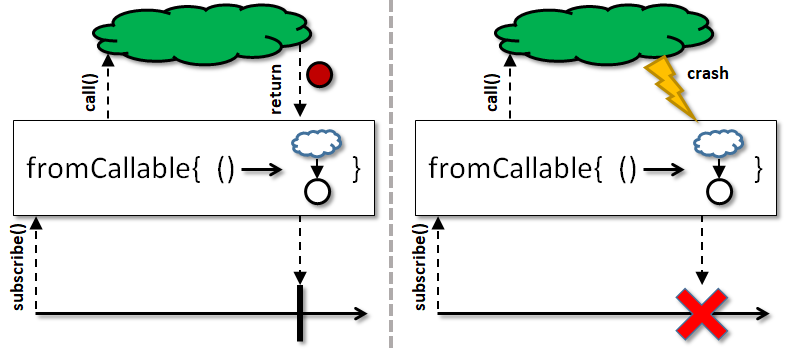
- Scheduler:
fromCallabledoes not operate by default on a particularScheduler.- Error handling:
- If the
Callablethrows an exception, the respectiveThrowableis delivered to the downstream viaCompletableObserver.onError(Throwable), except when the downstream has disposed thisCompletablesource. In this latter case, theThrowableis delivered to the global error handler viaRxJavaPlugins.onError(Throwable)as anUndeliverableException.
- Parameters:
callable- the callable instance to execute for each subscriber- Returns:
- the new Completable instance
- See Also:
defer(Supplier),fromSupplier(Supplier)
-
fromFuture
@CheckReturnValue @NonNull @SchedulerSupport(value="none") public static @NonNull Completable fromFuture(@NonNull @NonNull Future<?> future)
Returns a Completable instance that reacts to the termination of the given Future in a blocking fashion.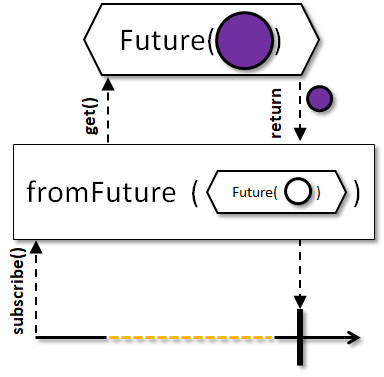
Note that if any of the observers to this Completable call dispose, this Completable will cancel the future.
- Scheduler:
fromFuturedoes not operate by default on a particularScheduler.
- Parameters:
future- the future to react to- Returns:
- the new Completable instance
-
fromMaybe
@CheckReturnValue @NonNull @SchedulerSupport(value="none") public static <T> @NonNull Completable fromMaybe(@NonNull @NonNull MaybeSource<T> maybe)
Returns a Completable instance that when subscribed to, subscribes to theMaybeinstance and emits a completion event if the maybe emitsonSuccess/onCompleteor forwards anyonErrorevents.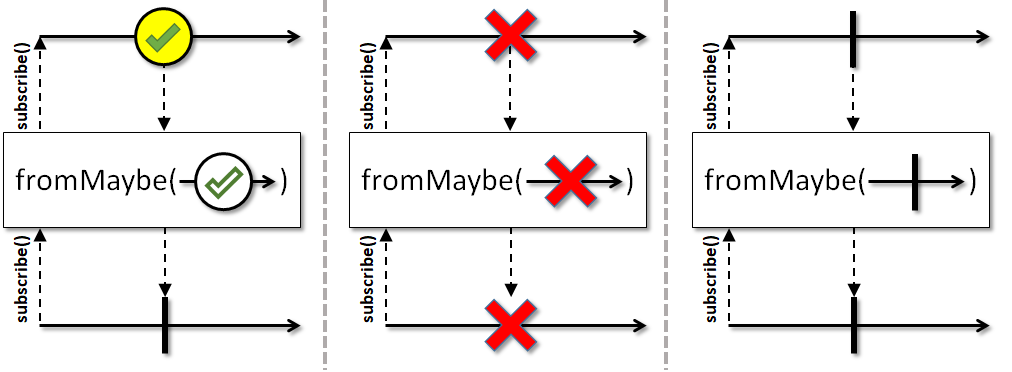
- Scheduler:
fromMaybedoes not operate by default on a particularScheduler.
History: 2.1.17 - beta
- Type Parameters:
T- the value type of theMaybeSourceelement- Parameters:
maybe- the Maybe instance to subscribe to, not null- Returns:
- the new Completable instance
- Throws:
NullPointerException- if single is null- Since:
- 2.2
-
fromRunnable
@CheckReturnValue @NonNull @SchedulerSupport(value="none") public static @NonNull Completable fromRunnable(@NonNull @NonNull Runnable run)
Returns a Completable instance that runs the given Runnable for each subscriber and emits either its exception or simply completes.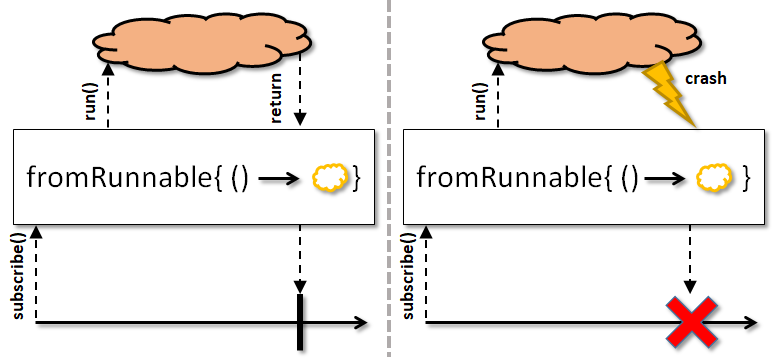
- Scheduler:
fromRunnabledoes not operate by default on a particularScheduler.- Error handling:
- If the
Runnablethrows an exception, the respectiveThrowableis delivered to the downstream viaCompletableObserver.onError(Throwable), except when the downstream has disposed thisCompletablesource. In this latter case, theThrowableis delivered to the global error handler viaRxJavaPlugins.onError(Throwable)as anUndeliverableException.
- Parameters:
run- the runnable to run for each subscriber- Returns:
- the new Completable instance
- Throws:
NullPointerException- if run is null
-
fromObservable
@CheckReturnValue @NonNull @SchedulerSupport(value="none") public static <T> @NonNull Completable fromObservable(@NonNull @NonNull ObservableSource<T> observable)
Returns a Completable instance that subscribes to the given Observable, ignores all values and emits only the terminal event.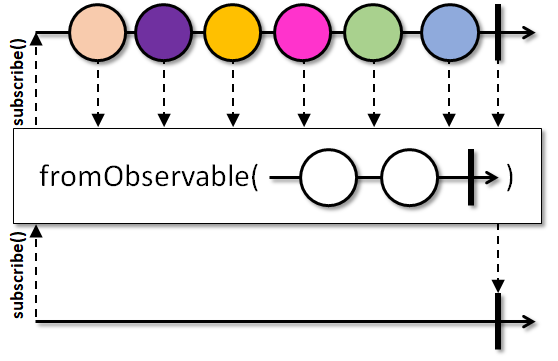
- Scheduler:
fromObservabledoes not operate by default on a particularScheduler.
- Type Parameters:
T- the type of the Observable- Parameters:
observable- the Observable instance to subscribe to, not null- Returns:
- the new Completable instance
- Throws:
NullPointerException- if flowable is null
-
fromPublisher
@CheckReturnValue @NonNull @BackpressureSupport(value=UNBOUNDED_IN) @SchedulerSupport(value="none") public static <T> @NonNull Completable fromPublisher(@NonNull @NonNull Publisher<T> publisher)
Returns a Completable instance that subscribes to the given publisher, ignores all values and emits only the terminal event.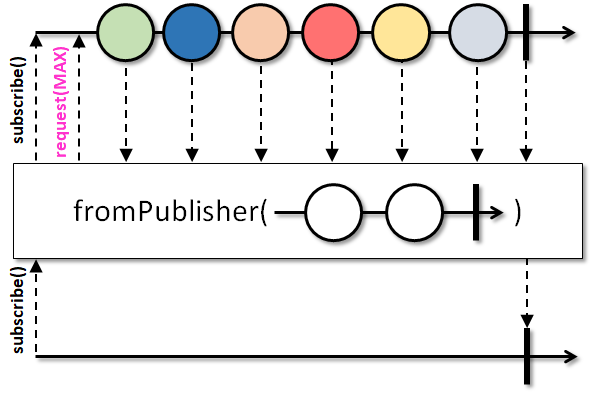
The
Publishermust follow the Reactive-Streams specification. Violating the specification may result in undefined behavior.If possible, use
create(CompletableOnSubscribe)to create a source-likeCompletableinstead.Note that even though
Publisherappears to be a functional interface, it is not recommended to implement it through a lambda as the specification requires state management that is not achievable with a stateless lambda.- Backpressure:
- The returned
Completablehonors the backpressure of the downstream consumer and expects the otherPublisherto honor it as well. - Scheduler:
fromPublisherdoes not operate by default on a particularScheduler.
- Type Parameters:
T- the type of the publisher- Parameters:
publisher- the Publisher instance to subscribe to, not null- Returns:
- the new Completable instance
- Throws:
NullPointerException- if publisher is null- See Also:
create(CompletableOnSubscribe)
-
fromSingle
@CheckReturnValue @NonNull @SchedulerSupport(value="none") public static <T> @NonNull Completable fromSingle(@NonNull @NonNull SingleSource<T> single)
Returns a Completable instance that when subscribed to, subscribes to the Single instance and emits a completion event if the single emits onSuccess or forwards any onError events.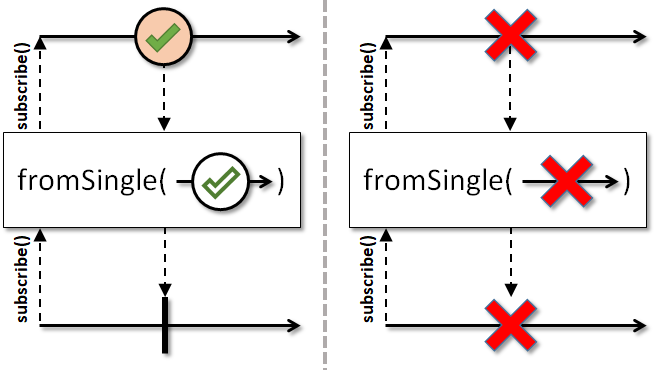
- Scheduler:
fromSingledoes not operate by default on a particularScheduler.
- Type Parameters:
T- the value type of the Single- Parameters:
single- the Single instance to subscribe to, not null- Returns:
- the new Completable instance
- Throws:
NullPointerException- if single is null
-
fromSupplier
@CheckReturnValue @NonNull @SchedulerSupport(value="none") public static @NonNull Completable fromSupplier(@NonNull @NonNull Supplier<?> supplier)
Returns a Completable which when subscribed, executes the supplier function, ignores its normal result and emits onError or onComplete only.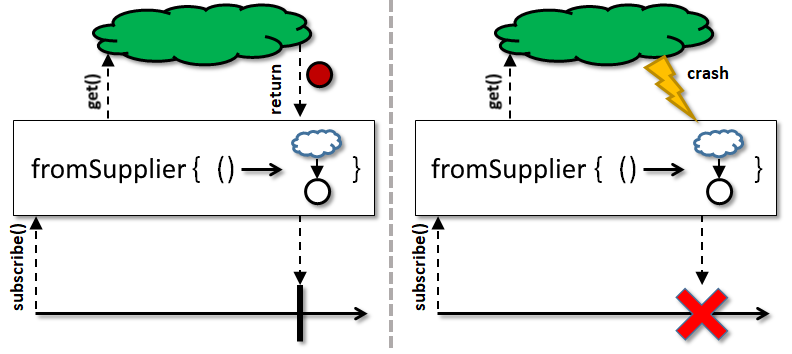
- Scheduler:
fromSupplierdoes not operate by default on a particularScheduler.- Error handling:
- If the
Supplierthrows an exception, the respectiveThrowableis delivered to the downstream viaCompletableObserver.onError(Throwable), except when the downstream has disposed thisCompletablesource. In this latter case, theThrowableis delivered to the global error handler viaRxJavaPlugins.onError(Throwable)as anUndeliverableException.
- Parameters:
supplier- the Supplier instance to execute for each subscriber- Returns:
- the new Completable instance
- Since:
- 3.0.0
- See Also:
defer(Supplier),fromCallable(Callable)
-
mergeArray
@CheckReturnValue @NonNull @SchedulerSupport(value="none") @SafeVarargs public static @NonNull Completable mergeArray(@NonNull CompletableSource... sources)
Returns a Completable instance that subscribes to all sources at once and completes only when all source Completables complete or one of them emits an error.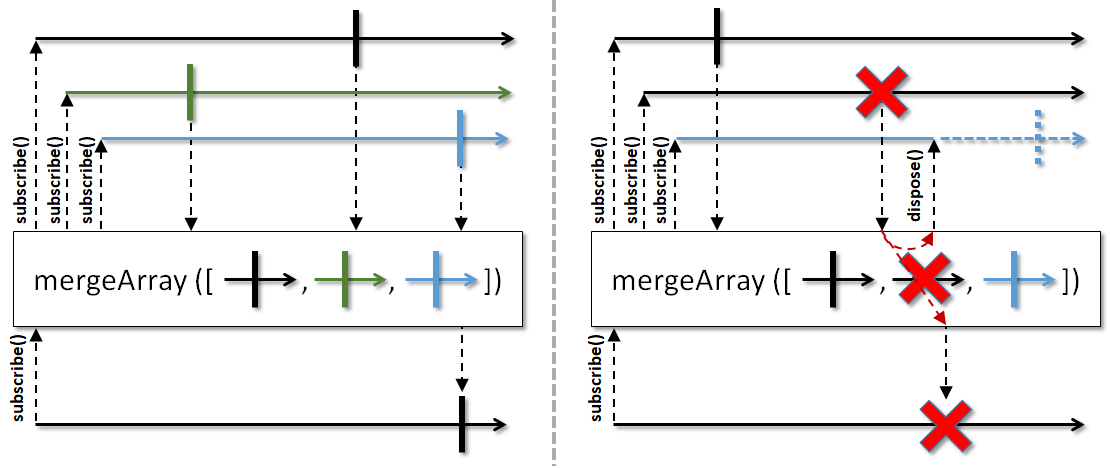
- Scheduler:
mergeArraydoes not operate by default on a particularScheduler.- Error handling:
- If any of the source
CompletableSources signal aThrowableviaonError, the resultingCompletableterminates with thatThrowableand all other sourceCompletableSources are disposed. If more than oneCompletableSourcesignals an error, the resultingCompletablemay terminate with the first one's error or, depending on the concurrency of the sources, may terminate with aCompositeExceptioncontaining two or more of the various error signals.Throwables that didn't make into the composite will be sent (individually) to the global error handler viaRxJavaPlugins.onError(Throwable)method asUndeliverableExceptionerrors. Similarly,Throwables signaled by source(s) after the returnedCompletablehas been disposed or terminated with a (composite) error will be sent to the same global error handler. UsemergeArrayDelayError(CompletableSource...)to merge sources and terminate only when all sourceCompletableSources have completed or failed with an error.
- Parameters:
sources- the iterable sequence of sources.- Returns:
- the new Completable instance
- Throws:
NullPointerException- if sources is null- See Also:
mergeArrayDelayError(CompletableSource...)
-
merge
@CheckReturnValue @NonNull @SchedulerSupport(value="none") public static @NonNull Completable merge(@NonNull @NonNull Iterable<? extends CompletableSource> sources)
Returns a Completable instance that subscribes to all sources at once and completes only when all source Completables complete or one of them emits an error.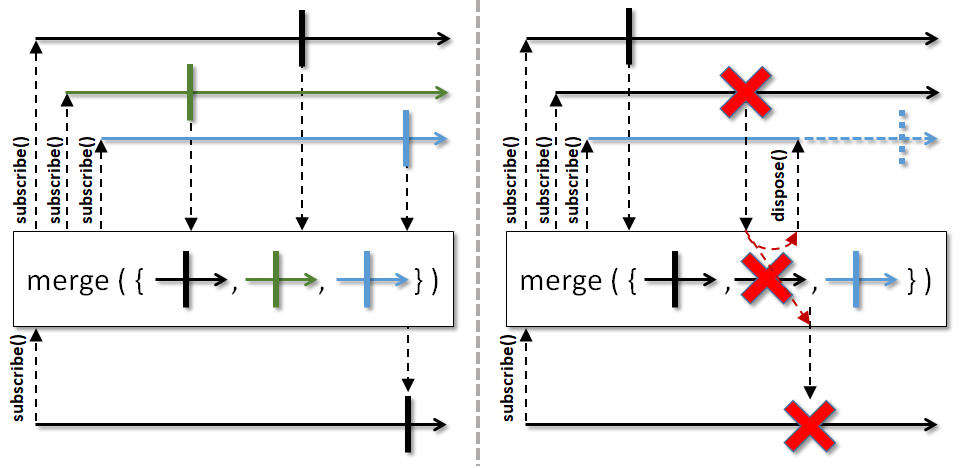
- Scheduler:
mergedoes not operate by default on a particularScheduler.- Error handling:
- If any of the source
CompletableSources signal aThrowableviaonError, the resultingCompletableterminates with thatThrowableand all other sourceCompletableSources are disposed. If more than oneCompletableSourcesignals an error, the resultingCompletablemay terminate with the first one's error or, depending on the concurrency of the sources, may terminate with aCompositeExceptioncontaining two or more of the various error signals.Throwables that didn't make into the composite will be sent (individually) to the global error handler viaRxJavaPlugins.onError(Throwable)method asUndeliverableExceptionerrors. Similarly,Throwables signaled by source(s) after the returnedCompletablehas been disposed or terminated with a (composite) error will be sent to the same global error handler. UsemergeDelayError(Iterable)to merge sources and terminate only when all sourceCompletableSources have completed or failed with an error.
- Parameters:
sources- the iterable sequence of sources.- Returns:
- the new Completable instance
- Throws:
NullPointerException- if sources is null- See Also:
mergeDelayError(Iterable)
-
merge
@CheckReturnValue @SchedulerSupport(value="none") @BackpressureSupport(value=UNBOUNDED_IN) @NonNull public static @NonNull Completable merge(@NonNull @NonNull Publisher<? extends CompletableSource> sources)
Returns a Completable instance that subscribes to all sources at once and completes only when all source Completables complete or one of them emits an error.
- Backpressure:
- The returned
Completablehonors the backpressure of the downstream consumer and expects the otherPublisherto honor it as well. - Scheduler:
mergedoes not operate by default on a particularScheduler.- Error handling:
- If any of the source
CompletableSources signal aThrowableviaonError, the resultingCompletableterminates with thatThrowableand all other sourceCompletableSources are disposed. If more than oneCompletableSourcesignals an error, the resultingCompletablemay terminate with the first one's error or, depending on the concurrency of the sources, may terminate with aCompositeExceptioncontaining two or more of the various error signals.Throwables that didn't make into the composite will be sent (individually) to the global error handler viaRxJavaPlugins.onError(Throwable)method asUndeliverableExceptionerrors. Similarly,Throwables signaled by source(s) after the returnedCompletablehas been disposed or terminated with a (composite) error will be sent to the same global error handler. UsemergeDelayError(Publisher)to merge sources and terminate only when all sourceCompletableSources have completed or failed with an error.
- Parameters:
sources- the iterable sequence of sources.- Returns:
- the new Completable instance
- Throws:
NullPointerException- if sources is null- See Also:
mergeDelayError(Publisher)
-
merge
@CheckReturnValue @SchedulerSupport(value="none") @BackpressureSupport(value=FULL) @NonNull public static @NonNull Completable merge(@NonNull @NonNull Publisher<? extends CompletableSource> sources, int maxConcurrency)
Returns a Completable instance that keeps subscriptions to a limited number of sources at once and completes only when all source Completables complete or one of them emits an error.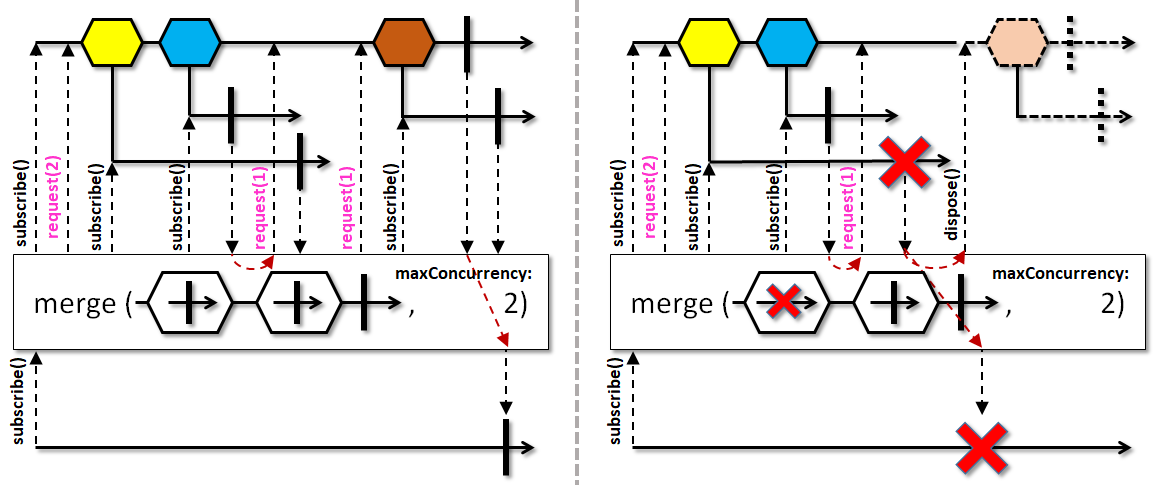
- Backpressure:
- The returned
Completablehonors the backpressure of the downstream consumer and expects the otherPublisherto honor it as well. - Scheduler:
mergedoes not operate by default on a particularScheduler.- Error handling:
- If any of the source
CompletableSources signal aThrowableviaonError, the resultingCompletableterminates with thatThrowableand all other sourceCompletableSources are disposed. If more than oneCompletableSourcesignals an error, the resultingCompletablemay terminate with the first one's error or, depending on the concurrency of the sources, may terminate with aCompositeExceptioncontaining two or more of the various error signals.Throwables that didn't make into the composite will be sent (individually) to the global error handler viaRxJavaPlugins.onError(Throwable)method asUndeliverableExceptionerrors. Similarly,Throwables signaled by source(s) after the returnedCompletablehas been disposed or terminated with a (composite) error will be sent to the same global error handler. UsemergeDelayError(Publisher, int)to merge sources and terminate only when all sourceCompletableSources have completed or failed with an error.
- Parameters:
sources- the iterable sequence of sources.maxConcurrency- the maximum number of concurrent subscriptions- Returns:
- the new Completable instance
- Throws:
NullPointerException- if sources is nullIllegalArgumentException- if maxConcurrency is less than 1- See Also:
mergeDelayError(Publisher, int)
-
mergeArrayDelayError
@CheckReturnValue @NonNull @SchedulerSupport(value="none") @SafeVarargs public static @NonNull Completable mergeArrayDelayError(@NonNull CompletableSource... sources)
Returns a CompletableConsumable that subscribes to all Completables in the source array and delays any error emitted by either the sources observable or any of the inner Completables until all of them terminate in a way or another.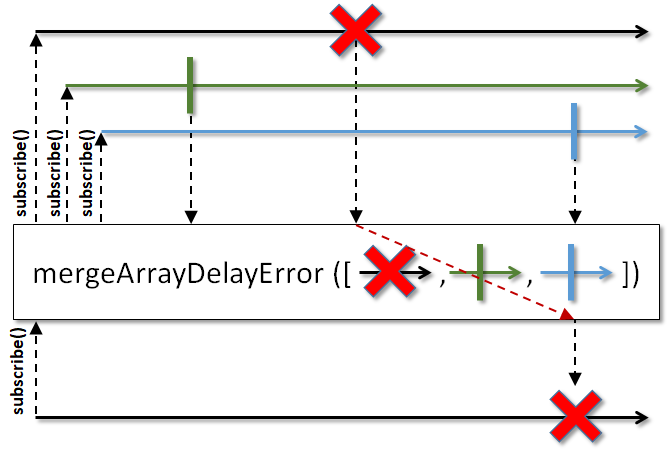
- Scheduler:
mergeArrayDelayErrordoes not operate by default on a particularScheduler.
- Parameters:
sources- the array of Completables- Returns:
- the new Completable instance
- Throws:
NullPointerException- if sources is null
-
mergeDelayError
@CheckReturnValue @NonNull @SchedulerSupport(value="none") public static @NonNull Completable mergeDelayError(@NonNull @NonNull Iterable<? extends CompletableSource> sources)
Returns a Completable that subscribes to all Completables in the source sequence and delays any error emitted by either the sources observable or any of the inner Completables until all of them terminate in a way or another.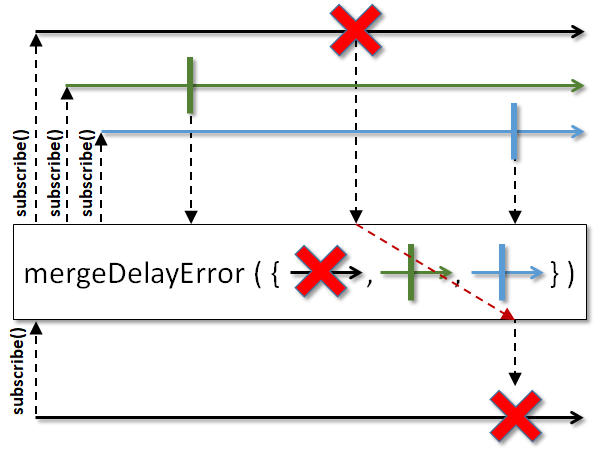
- Scheduler:
mergeDelayErrordoes not operate by default on a particularScheduler.
- Parameters:
sources- the sequence of Completables- Returns:
- the new Completable instance
- Throws:
NullPointerException- if sources is null
-
mergeDelayError
@CheckReturnValue @SchedulerSupport(value="none") @BackpressureSupport(value=UNBOUNDED_IN) @NonNull public static @NonNull Completable mergeDelayError(@NonNull @NonNull Publisher<? extends CompletableSource> sources)
Returns a Completable that subscribes to all Completables in the source sequence and delays any error emitted by either the sources observable or any of the inner Completables until all of them terminate in a way or another.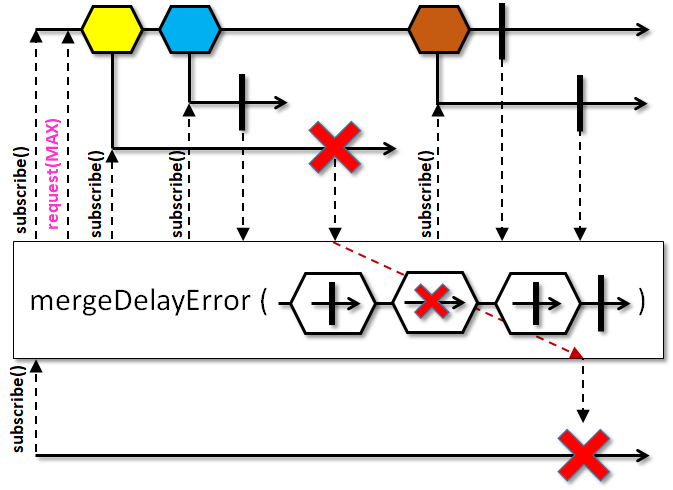
- Backpressure:
- The returned
Completablehonors the backpressure of the downstream consumer and expects the otherPublisherto honor it as well. - Scheduler:
mergeDelayErrordoes not operate by default on a particularScheduler.
- Parameters:
sources- the sequence of Completables- Returns:
- the new Completable instance
- Throws:
NullPointerException- if sources is null
-
mergeDelayError
@CheckReturnValue @SchedulerSupport(value="none") @BackpressureSupport(value=FULL) @NonNull public static @NonNull Completable mergeDelayError(@NonNull @NonNull Publisher<? extends CompletableSource> sources, int maxConcurrency)
Returns a Completable that subscribes to a limited number of inner Completables at once in the source sequence and delays any error emitted by either the sources observable or any of the inner Completables until all of them terminate in a way or another.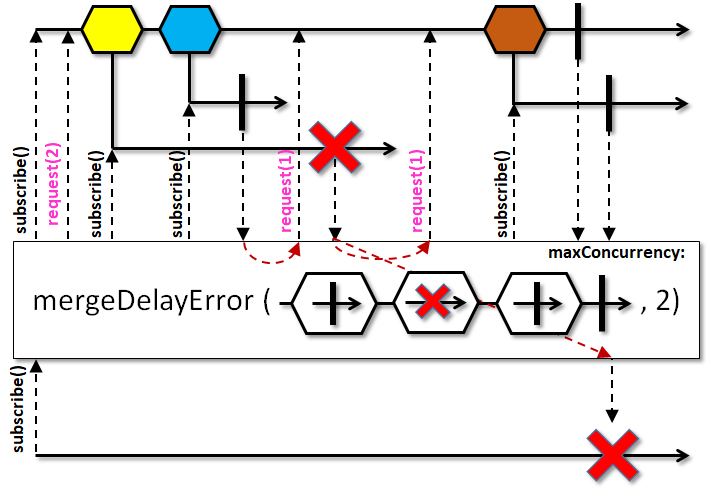
- Backpressure:
- The returned
Completablehonors the backpressure of the downstream consumer and expects the otherPublisherto honor it as well. - Scheduler:
mergeDelayErrordoes not operate by default on a particularScheduler.
- Parameters:
sources- the sequence of CompletablesmaxConcurrency- the maximum number of concurrent subscriptions to Completables- Returns:
- the new Completable instance
- Throws:
NullPointerException- if sources is null
-
never
@CheckReturnValue @SchedulerSupport(value="none") @NonNull public static @NonNull Completable never()
Returns a Completable that never calls onError or onComplete.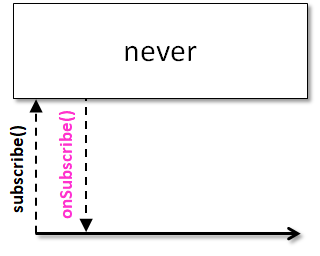
- Scheduler:
neverdoes not operate by default on a particularScheduler.
- Returns:
- the singleton instance that never calls onError or onComplete
-
timer
@CheckReturnValue @SchedulerSupport(value="io.reactivex:computation") @NonNull public static @NonNull Completable timer(long delay, @NonNull @NonNull TimeUnit unit)
Returns a Completable instance that fires its onComplete event after the given delay elapsed.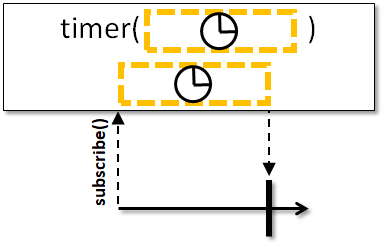
- Scheduler:
timerdoes operate by default on thecomputationScheduler.
- Parameters:
delay- the delay timeunit- the delay unit- Returns:
- the new Completable instance
-
timer
@CheckReturnValue @NonNull @SchedulerSupport(value="custom") public static @NonNull Completable timer(long delay, @NonNull @NonNull TimeUnit unit, @NonNull @NonNull Scheduler scheduler)
Returns a Completable instance that fires its onComplete event after the given delay elapsed by using the supplied scheduler.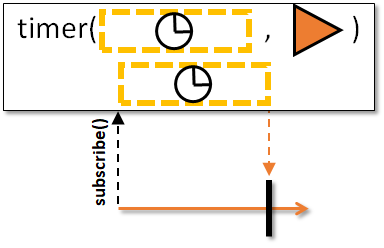
- Scheduler:
timeroperates on theScheduleryou specify.
- Parameters:
delay- the delay timeunit- the delay unitscheduler- the scheduler where to emit the complete event- Returns:
- the new Completable instance
-
using
@CheckReturnValue @SchedulerSupport(value="none") @NonNull public static <R> @NonNull Completable using(@NonNull @NonNull Supplier<R> resourceSupplier, @NonNull @NonNull Function<? super R,? extends CompletableSource> completableFunction, @NonNull @NonNull Consumer<? super R> disposer)
Returns a Completable instance which manages a resource along with a custom Completable instance while the subscription is active.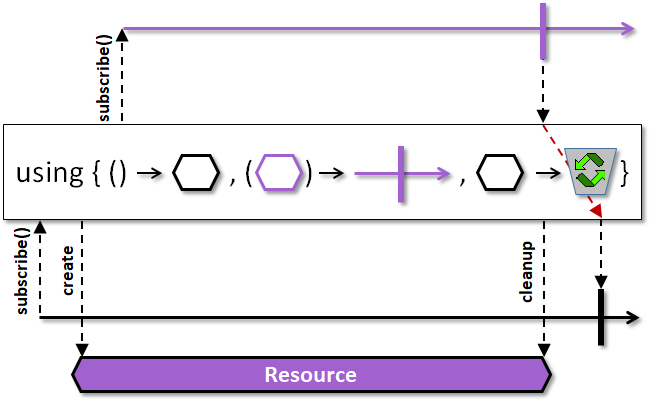
This overload disposes eagerly before the terminal event is emitted.
- Scheduler:
usingdoes not operate by default on a particularScheduler.
- Type Parameters:
R- the resource type- Parameters:
resourceSupplier- the supplier that returns a resource to be managed.completableFunction- the function that given a resource returns a Completable instance that will be subscribed todisposer- the consumer that disposes the resource created by the resource supplier- Returns:
- the new Completable instance
-
using
@CheckReturnValue @NonNull @SchedulerSupport(value="none") public static <R> @NonNull Completable using(@NonNull @NonNull Supplier<R> resourceSupplier, @NonNull @NonNull Function<? super R,? extends CompletableSource> completableFunction, @NonNull @NonNull Consumer<? super R> disposer, boolean eager)
Returns a Completable instance which manages a resource along with a custom Completable instance while the subscription is active and performs eager or lazy resource disposition.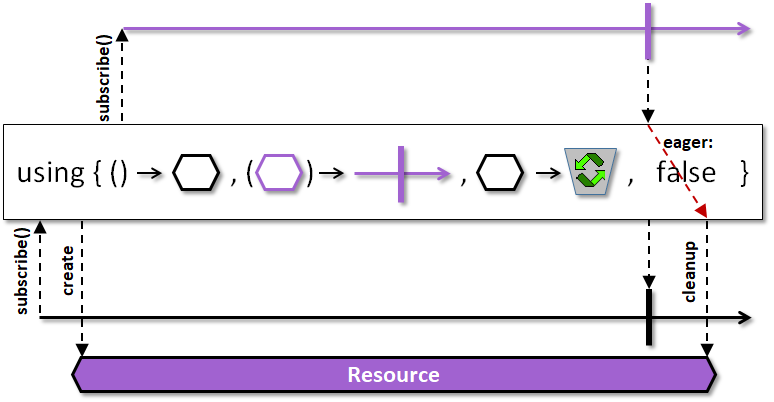
If this overload performs a lazy disposal after the terminal event is emitted. Exceptions thrown at this time will be delivered to RxJavaPlugins only.
- Scheduler:
usingdoes not operate by default on a particularScheduler.
- Type Parameters:
R- the resource type- Parameters:
resourceSupplier- the supplier that returns a resource to be managedcompletableFunction- the function that given a resource returns a non-null Completable instance that will be subscribed todisposer- the consumer that disposes the resource created by the resource suppliereager- Iftruethen resource disposal will happen either on adispose()call before the upstream is disposed or just before the emission of a terminal event (onCompleteoronError). Iffalsethe resource disposal will happen either on adispose()call after the upstream is disposed or just after the emission of a terminal event (onCompleteoronError).- Returns:
- the new Completable instance
-
wrap
@CheckReturnValue @NonNull @SchedulerSupport(value="none") public static @NonNull Completable wrap(@NonNull @NonNull CompletableSource source)
Wraps the given CompletableSource into a Completable if not already Completable.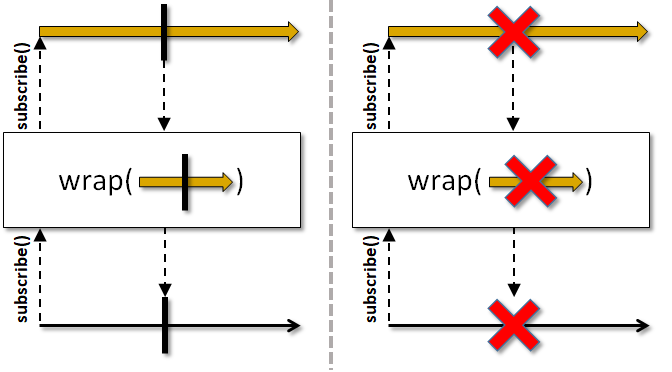
- Scheduler:
wrapdoes not operate by default on a particularScheduler.
- Parameters:
source- the source to wrap- Returns:
- the source or its wrapper Completable
- Throws:
NullPointerException- if source is null
-
ambWith
@CheckReturnValue @NonNull @SchedulerSupport(value="none") public final @NonNull Completable ambWith(@NonNull @NonNull CompletableSource other)
Returns a Completable that emits the a terminated event of either this Completable or the other Completable whichever fires first.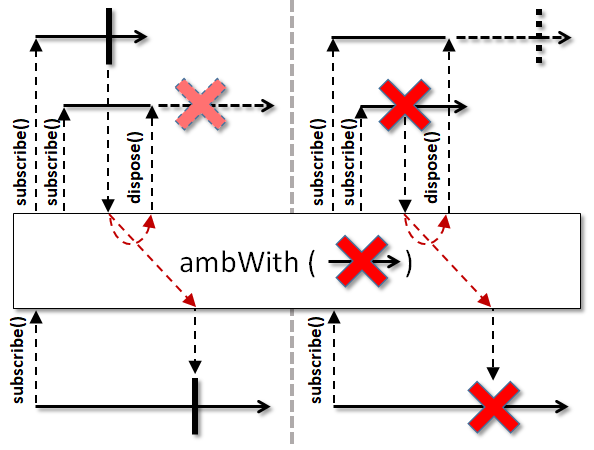
- Scheduler:
ambWithdoes not operate by default on a particularScheduler.
- Parameters:
other- the other Completable, not null. A subscription to this provided source will occur after subscribing to the current source.- Returns:
- the new Completable instance
- Throws:
NullPointerException- if other is null
-
andThen
@CheckReturnValue @NonNull @SchedulerSupport(value="none") public final <T> @NonNull Observable<T> andThen(@NonNull @NonNull ObservableSource<T> next)
Returns an Observable which will subscribe to this Completable and once that is completed then will subscribe to thenextObservableSource. An error event from this Completable will be propagated to the downstream subscriber and will result in skipping the subscription of the Observable.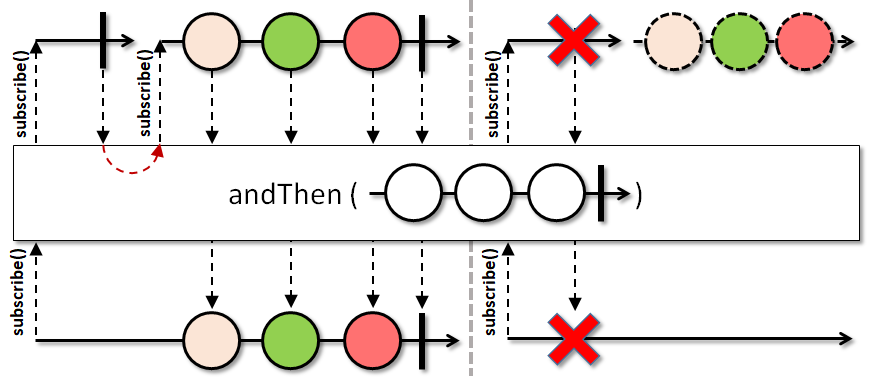
- Scheduler:
andThendoes not operate by default on a particularScheduler.
- Type Parameters:
T- the value type of the next ObservableSource- Parameters:
next- the Observable to subscribe after this Completable is completed, not null- Returns:
- Observable that composes this Completable and next
- Throws:
NullPointerException- if next is null
-
andThen
@CheckReturnValue @NonNull @BackpressureSupport(value=FULL) @SchedulerSupport(value="none") public final <T> @NonNull Flowable<T> andThen(@NonNull @NonNull Publisher<T> next)
Returns a Flowable which will subscribe to this Completable and once that is completed then will subscribe to thenextFlowable. An error event from this Completable will be propagated to the downstream subscriber and will result in skipping the subscription of the Publisher.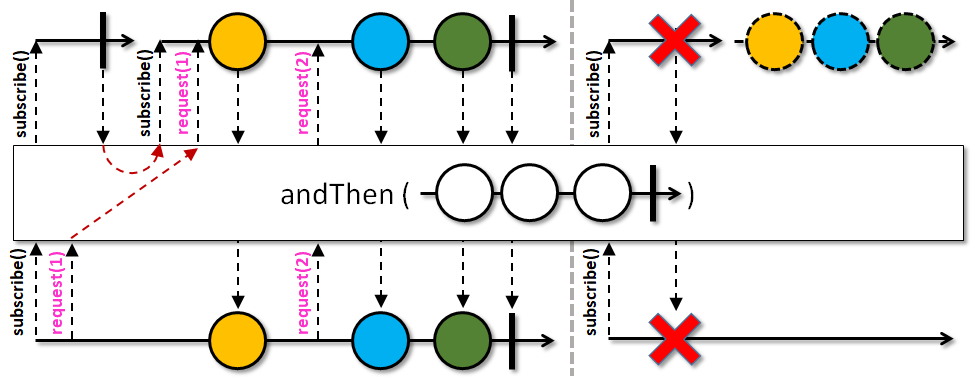
- Backpressure:
- The returned
Flowablehonors the backpressure of the downstream consumer and expects the otherPublisherto honor it as well. - Scheduler:
andThendoes not operate by default on a particularScheduler.
- Type Parameters:
T- the value type of the next Publisher- Parameters:
next- the Publisher to subscribe after this Completable is completed, not null- Returns:
- Flowable that composes this Completable and next
- Throws:
NullPointerException- if next is null
-
andThen
@CheckReturnValue @NonNull @SchedulerSupport(value="none") public final <T> @NonNull Single<T> andThen(@NonNull @NonNull SingleSource<T> next)
Returns a Single which will subscribe to this Completable and once that is completed then will subscribe to thenextSingleSource. An error event from this Completable will be propagated to the downstream subscriber and will result in skipping the subscription of the Single.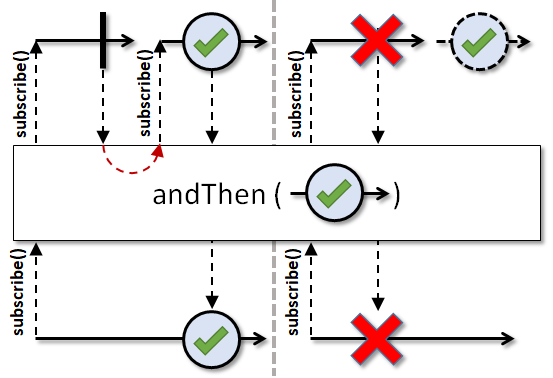
- Scheduler:
andThendoes not operate by default on a particularScheduler.
- Type Parameters:
T- the value type of the next SingleSource- Parameters:
next- the Single to subscribe after this Completable is completed, not null- Returns:
- Single that composes this Completable and next
-
andThen
@CheckReturnValue @NonNull @SchedulerSupport(value="none") public final <T> @NonNull Maybe<T> andThen(@NonNull @NonNull MaybeSource<T> next)
Returns aMaybewhich will subscribe to this Completable and once that is completed then will subscribe to thenextMaybeSource. An error event from this Completable will be propagated to the downstream subscriber and will result in skipping the subscription of the Maybe.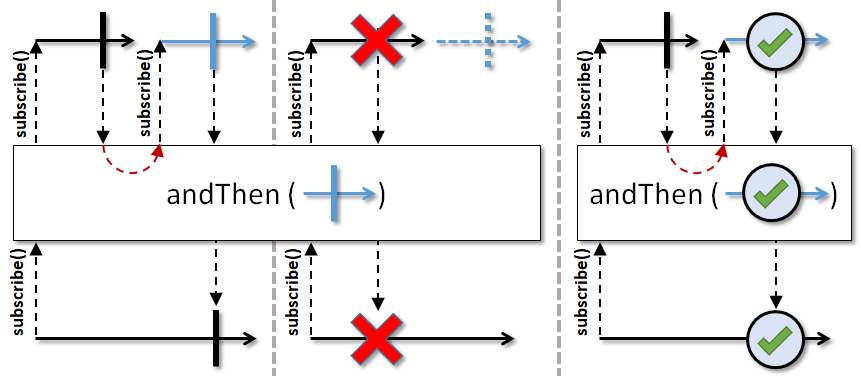
- Scheduler:
andThendoes not operate by default on a particularScheduler.
- Type Parameters:
T- the value type of the next MaybeSource- Parameters:
next- the Maybe to subscribe after this Completable is completed, not null- Returns:
- Maybe that composes this Completable and next
-
andThen
@CheckReturnValue @SchedulerSupport(value="none") @NonNull public final @NonNull Completable andThen(@NonNull @NonNull CompletableSource next)
Returns a Completable that first runs this Completable and then the other completable.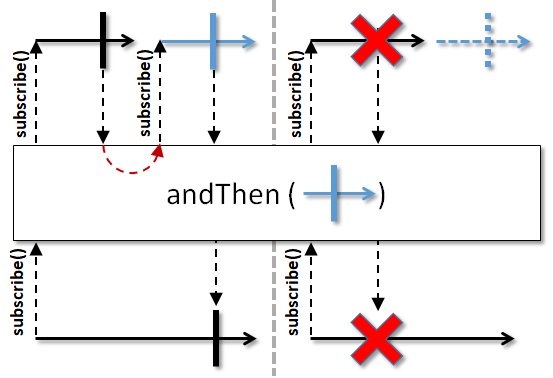
This is an alias for
concatWith(CompletableSource).- Scheduler:
andThendoes not operate by default on a particularScheduler.
- Parameters:
next- the other Completable, not null- Returns:
- the new Completable instance
- Throws:
NullPointerException- if other is null
-
blockingAwait
@SchedulerSupport(value="none") public final void blockingAwait()
Subscribes to and awaits the termination of this Completable instance in a blocking manner and rethrows any exception emitted.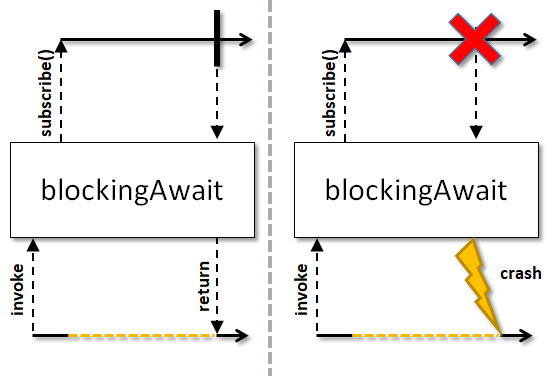
- Scheduler:
blockingAwaitdoes not operate by default on a particularScheduler.- Error handling:
- If the source signals an error, the operator wraps a checked
ExceptionintoRuntimeExceptionand throws that. Otherwise,RuntimeExceptions andErrors are rethrown as they are.
- Throws:
RuntimeException- wrapping an InterruptedException if the current thread is interrupted
-
blockingAwait
@CheckReturnValue @SchedulerSupport(value="none") public final boolean blockingAwait(long timeout, @NonNull @NonNull TimeUnit unit)
Subscribes to and awaits the termination of this Completable instance in a blocking manner with a specific timeout and rethrows any exception emitted within the timeout window.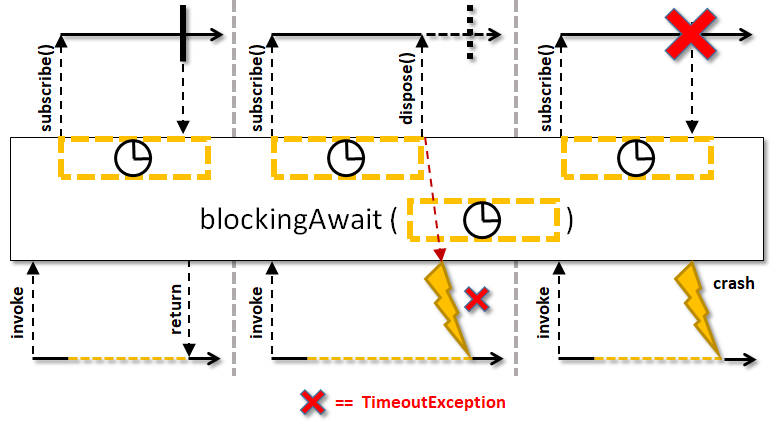
- Scheduler:
blockingAwaitdoes not operate by default on a particularScheduler.- Error handling:
- If the source signals an error, the operator wraps a checked
ExceptionintoRuntimeExceptionand throws that. Otherwise,RuntimeExceptions andErrors are rethrown as they are.
- Parameters:
timeout- the timeout valueunit- the timeout unit- Returns:
- true if the this Completable instance completed normally within the time limit, false if the timeout elapsed before this Completable terminated.
- Throws:
RuntimeException- wrapping an InterruptedException if the current thread is interrupted
-
cache
@CheckReturnValue @SchedulerSupport(value="none") @NonNull public final @NonNull Completable cache()
Subscribes to this Completable only once, when the first CompletableObserver subscribes to the result Completable, caches its terminal event and relays/replays it to observers.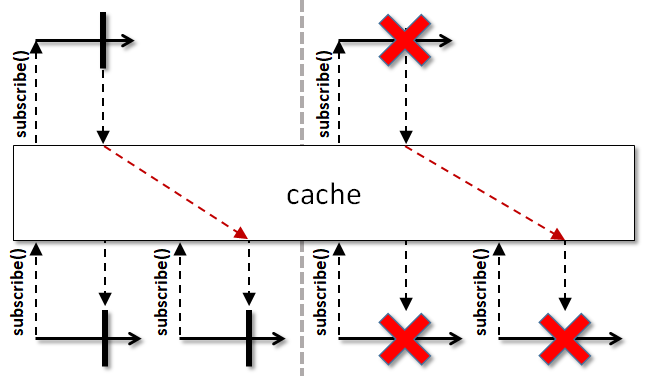
Note that this operator doesn't allow disposing the connection of the upstream source.
- Scheduler:
cachedoes not operate by default on a particularScheduler.
History: 2.0.4 - experimental
- Returns:
- the new Completable instance
- Since:
- 2.1
-
compose
@CheckReturnValue @SchedulerSupport(value="none") @NonNull public final @NonNull Completable compose(@NonNull @NonNull CompletableTransformer transformer)
Calls the given transformer function with this instance and returns the function's resulting Completable.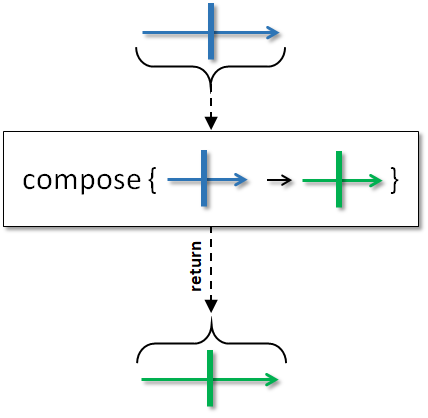
- Scheduler:
composedoes not operate by default on a particularScheduler.
- Parameters:
transformer- the transformer function, not null- Returns:
- the Completable returned by the function
- Throws:
NullPointerException- if transformer is null
-
concatWith
@CheckReturnValue @NonNull @SchedulerSupport(value="none") public final @NonNull Completable concatWith(@NonNull @NonNull CompletableSource other)
Concatenates this Completable with another Completable.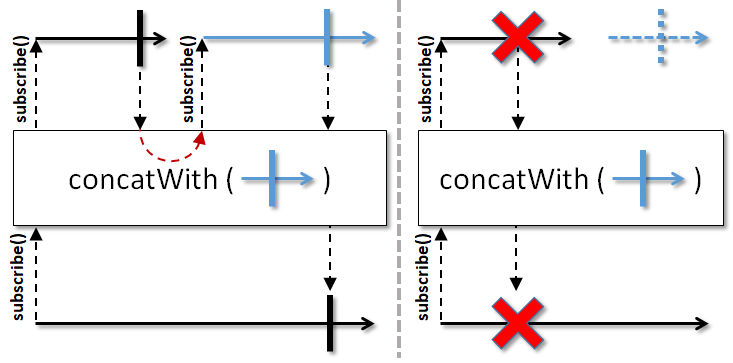
- Scheduler:
concatWithdoes not operate by default on a particularScheduler.
- Parameters:
other- the other Completable, not null- Returns:
- the new Completable which subscribes to this and then the other Completable
- Throws:
NullPointerException- if other is null- See Also:
andThen(MaybeSource),andThen(ObservableSource),andThen(SingleSource),andThen(Publisher)
-
delay
@CheckReturnValue @SchedulerSupport(value="io.reactivex:computation") @NonNull public final @NonNull Completable delay(long delay, @NonNull @NonNull TimeUnit unit)
Returns a Completable which delays the emission of the completion event by the given time.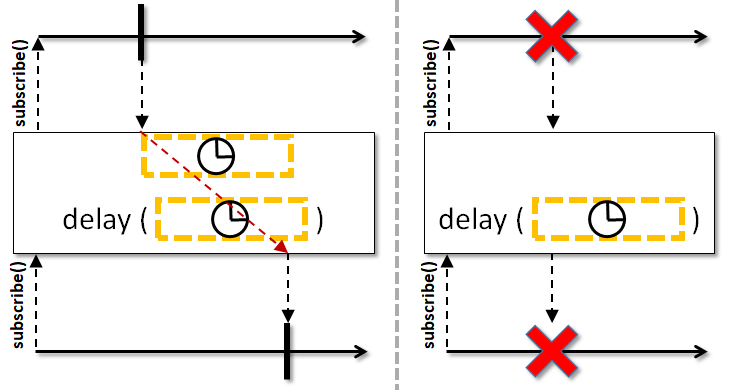
- Scheduler:
delaydoes operate by default on thecomputationScheduler.
- Parameters:
delay- the delay timeunit- the delay unit- Returns:
- the new Completable instance
- Throws:
NullPointerException- if unit is null
-
delay
@CheckReturnValue @SchedulerSupport(value="custom") @NonNull public final @NonNull Completable delay(long delay, @NonNull @NonNull TimeUnit unit, @NonNull @NonNull Scheduler scheduler)
Returns a Completable which delays the emission of the completion event by the given time while running on the specified scheduler.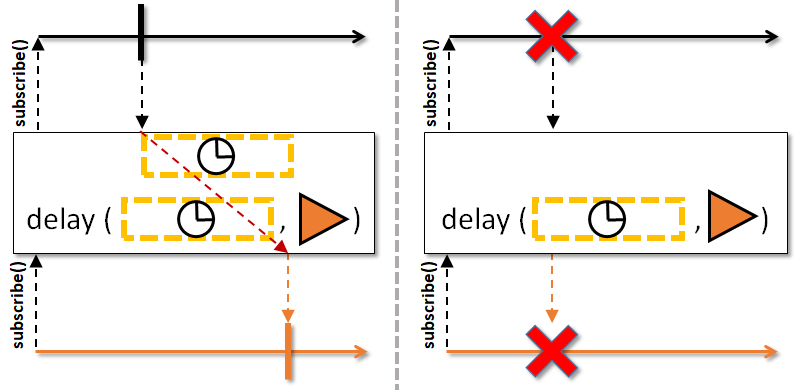
- Scheduler:
delayoperates on theScheduleryou specify.
- Parameters:
delay- the delay timeunit- the delay unitscheduler- the scheduler to run the delayed completion on- Returns:
- the new Completable instance
- Throws:
NullPointerException- if unit or scheduler is null
-
delay
@CheckReturnValue @NonNull @SchedulerSupport(value="custom") public final @NonNull Completable delay(long delay, @NonNull @NonNull TimeUnit unit, @NonNull @NonNull Scheduler scheduler, boolean delayError)
Returns a Completable which delays the emission of the completion event, and optionally the error as well, by the given time while running on the specified scheduler.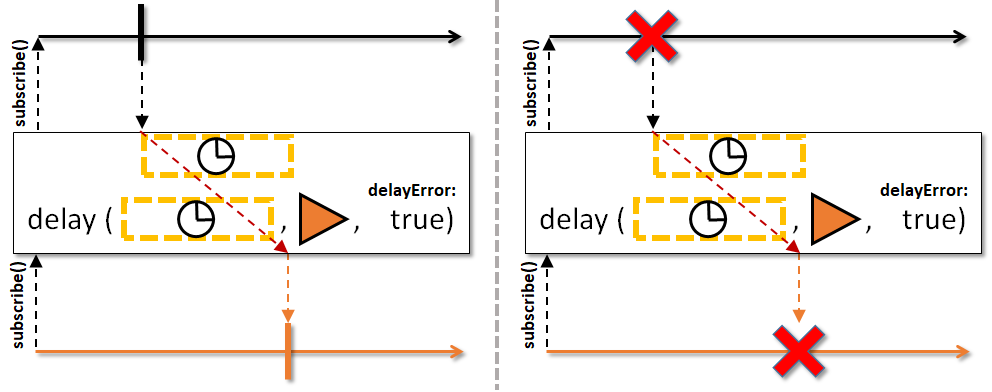
- Scheduler:
delayoperates on theScheduleryou specify.
- Parameters:
delay- the delay timeunit- the delay unitscheduler- the scheduler to run the delayed completion ondelayError- delay the error emission as well?- Returns:
- the new Completable instance
- Throws:
NullPointerException- if unit or scheduler is null
-
delaySubscription
@CheckReturnValue @SchedulerSupport(value="io.reactivex:computation") @NonNull public final @NonNull Completable delaySubscription(long delay, @NonNull @NonNull TimeUnit unit)
Returns a Completable that delays the subscription to the source CompletableSource by a given amount of time.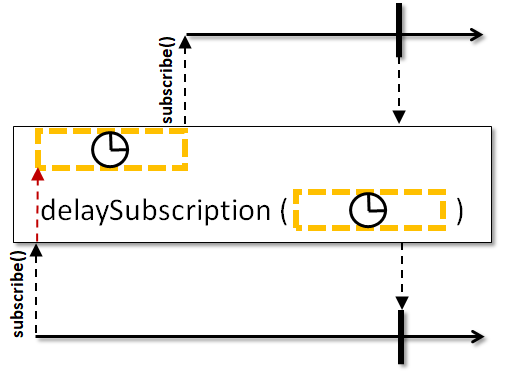
- Scheduler:
- This version of
delaySubscriptionoperates by default on thecomputationScheduler.
History: 2.2.3 - experimental
- Parameters:
delay- the time to delay the subscriptionunit- the time unit ofdelay- Returns:
- a Completable that delays the subscription to the source CompletableSource by the given amount
- Since:
- 3.0.0
- See Also:
- ReactiveX operators documentation: Delay
-
delaySubscription
@CheckReturnValue @SchedulerSupport(value="custom") @NonNull public final @NonNull Completable delaySubscription(long delay, @NonNull @NonNull TimeUnit unit, @NonNull @NonNull Scheduler scheduler)
Returns a Completable that delays the subscription to the source CompletableSource by a given amount of time, both waiting and subscribing on a given Scheduler.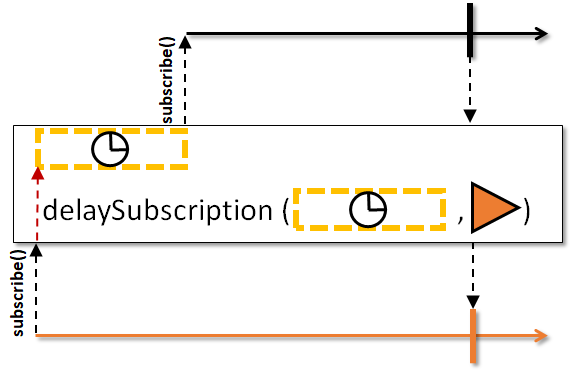
- Scheduler:
- You specify which
Schedulerthis operator will use.
History: 2.2.3 - experimental
- Parameters:
delay- the time to delay the subscriptionunit- the time unit ofdelayscheduler- the Scheduler on which the waiting and subscription will happen- Returns:
- a Completable that delays the subscription to the source CompletableSource by a given amount, waiting and subscribing on the given Scheduler
- Since:
- 3.0.0
- See Also:
- ReactiveX operators documentation: Delay
-
doOnComplete
@CheckReturnValue @SchedulerSupport(value="none") @NonNull public final @NonNull Completable doOnComplete(@NonNull @NonNull Action onComplete)
Returns a Completable which calls the given onComplete callback if this Completable completes.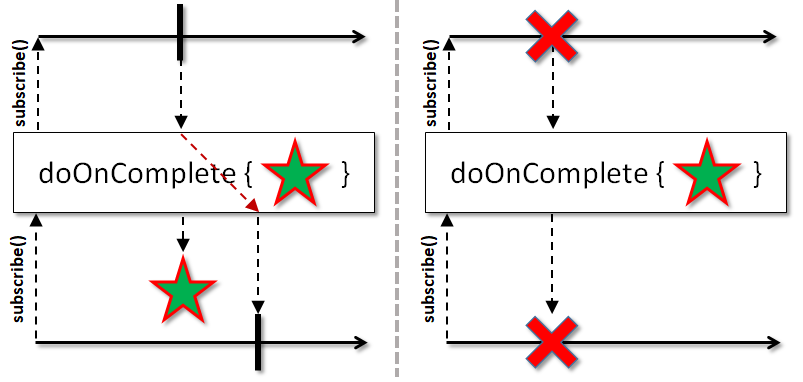
- Scheduler:
doOnCompletedoes not operate by default on a particularScheduler.
- Parameters:
onComplete- the callback to call when this emits an onComplete event- Returns:
- the new Completable instance
- Throws:
NullPointerException- if onComplete is null- See Also:
doFinally(Action)
-
doOnDispose
@CheckReturnValue @SchedulerSupport(value="none") @NonNull public final @NonNull Completable doOnDispose(@NonNull @NonNull Action onDispose)
Calls the sharedActionif a CompletableObserver subscribed to the current Completable disposes the common Disposable it received via onSubscribe.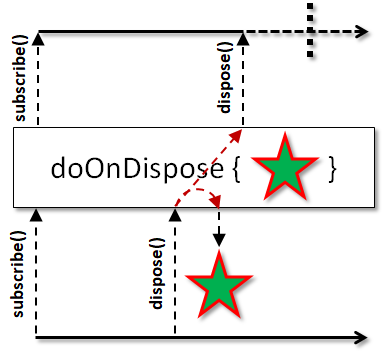
- Scheduler:
doOnDisposedoes not operate by default on a particularScheduler.
- Parameters:
onDispose- the action to call when the child subscriber disposes the subscription- Returns:
- the new Completable instance
- Throws:
NullPointerException- if onDispose is null
-
doOnError
@CheckReturnValue @SchedulerSupport(value="none") @NonNull public final @NonNull Completable doOnError(@NonNull @NonNull Consumer<? super Throwable> onError)
Returns a Completable which calls the given onError callback if this Completable emits an error.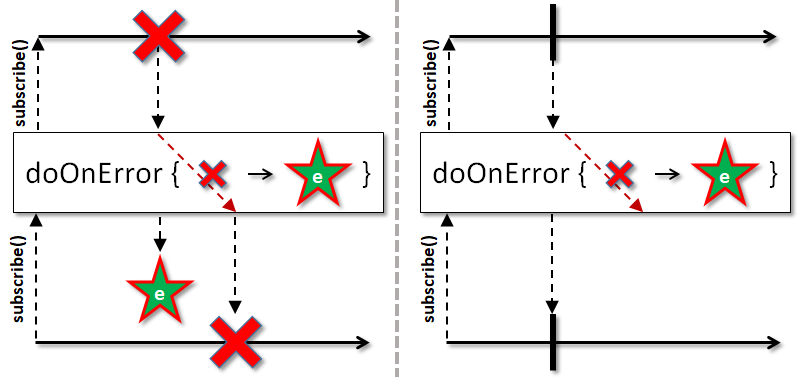
- Scheduler:
doOnErrordoes not operate by default on a particularScheduler.
- Parameters:
onError- the error callback- Returns:
- the new Completable instance
- Throws:
NullPointerException- if onError is null- See Also:
doFinally(Action)
-
doOnEvent
@CheckReturnValue @NonNull @SchedulerSupport(value="none") public final @NonNull Completable doOnEvent(@NonNull @NonNull Consumer<? super Throwable> onEvent)
Returns a Completable which calls the given onEvent callback with the (throwable) for an onError or (null) for an onComplete signal from this Completable before delivering said signal to the downstream.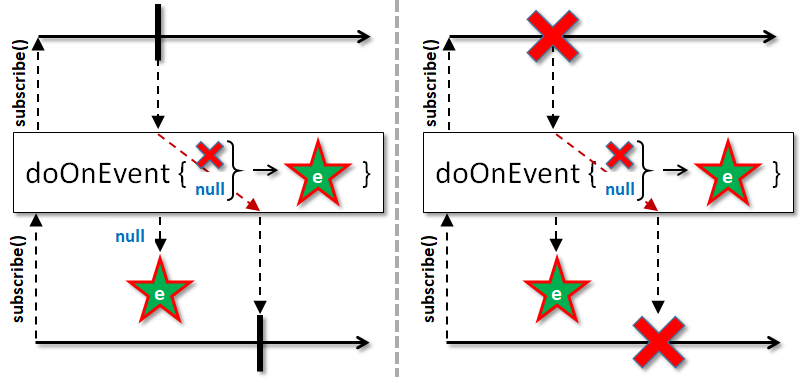
- Scheduler:
doOnEventdoes not operate by default on a particularScheduler.
- Parameters:
onEvent- the event callback- Returns:
- the new Completable instance
- Throws:
NullPointerException- if onEvent is null
-
doOnSubscribe
@CheckReturnValue @SchedulerSupport(value="none") @NonNull public final @NonNull Completable doOnSubscribe(@NonNull @NonNull Consumer<? super Disposable> onSubscribe)
Returns a Completable instance that calls the given onSubscribe callback with the disposable that child subscribers receive on subscription.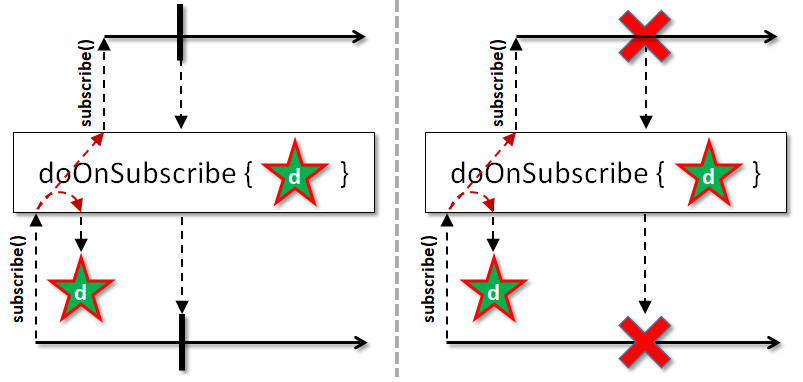
- Scheduler:
doOnSubscribedoes not operate by default on a particularScheduler.
- Parameters:
onSubscribe- the callback called when a child subscriber subscribes- Returns:
- the new Completable instance
- Throws:
NullPointerException- if onSubscribe is null
-
doOnTerminate
@CheckReturnValue @SchedulerSupport(value="none") @NonNull public final @NonNull Completable doOnTerminate(@NonNull @NonNull Action onTerminate)
Returns a Completable instance that calls the given onTerminate callback just before this Completable completes normally or with an exception.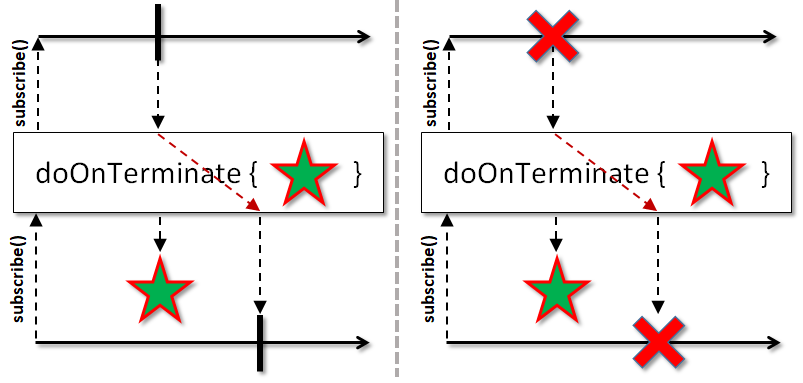
- Scheduler:
doOnTerminatedoes not operate by default on a particularScheduler.
- Parameters:
onTerminate- the callback to call just before this Completable terminates- Returns:
- the new Completable instance
- See Also:
doFinally(Action)
-
doAfterTerminate
@CheckReturnValue @SchedulerSupport(value="none") @NonNull public final @NonNull Completable doAfterTerminate(@NonNull @NonNull Action onAfterTerminate)
Returns a Completable instance that calls the given onTerminate callback after this Completable completes normally or with an exception.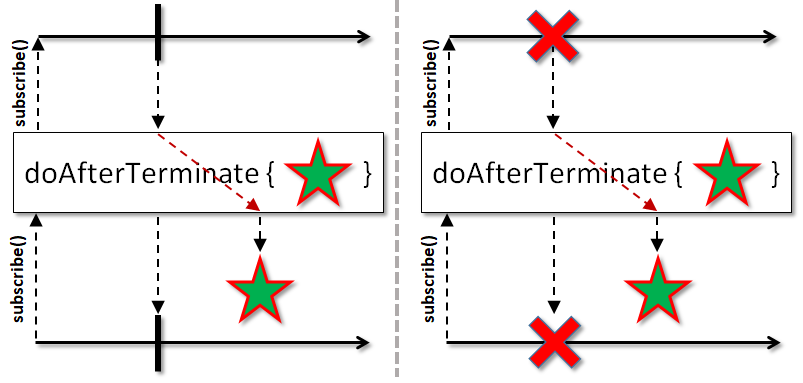
- Scheduler:
doAfterTerminatedoes not operate by default on a particularScheduler.
- Parameters:
onAfterTerminate- the callback to call after this Completable terminates- Returns:
- the new Completable instance
- See Also:
doFinally(Action)
-
doFinally
@CheckReturnValue @NonNull @SchedulerSupport(value="none") public final @NonNull Completable doFinally(@NonNull @NonNull Action onFinally)
Calls the specified action after this Completable signals onError or onComplete or gets disposed by the downstream.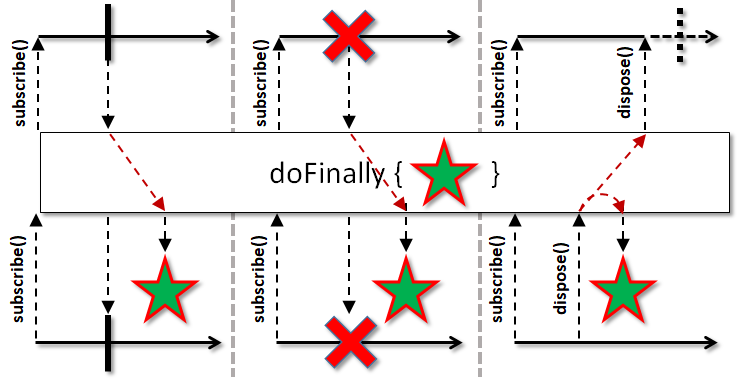
In case of a race between a terminal event and a dispose call, the provided
onFinallyaction is executed once per subscription.Note that the
onFinallyaction is shared between subscriptions and as such should be thread-safe.- Scheduler:
doFinallydoes not operate by default on a particularScheduler.
History: 2.0.1 - experimental
- Parameters:
onFinally- the action called when this Completable terminates or gets disposed- Returns:
- the new Completable instance
- Since:
- 2.1
-
lift
@CheckReturnValue @NonNull @SchedulerSupport(value="none") public final @NonNull Completable lift(@NonNull @NonNull CompletableOperator onLift)
This method requires advanced knowledge about building operators, please consider other standard composition methods first; Returns aCompletablewhich, when subscribed to, invokes theapply(CompletableObserver)method of the providedCompletableOperatorfor each individual downstreamCompletableand allows the insertion of a custom operator by accessing the downstream'sCompletableObserverduring this subscription phase and providing a newCompletableObserver, containing the custom operator's intended business logic, that will be used in the subscription process going further upstream.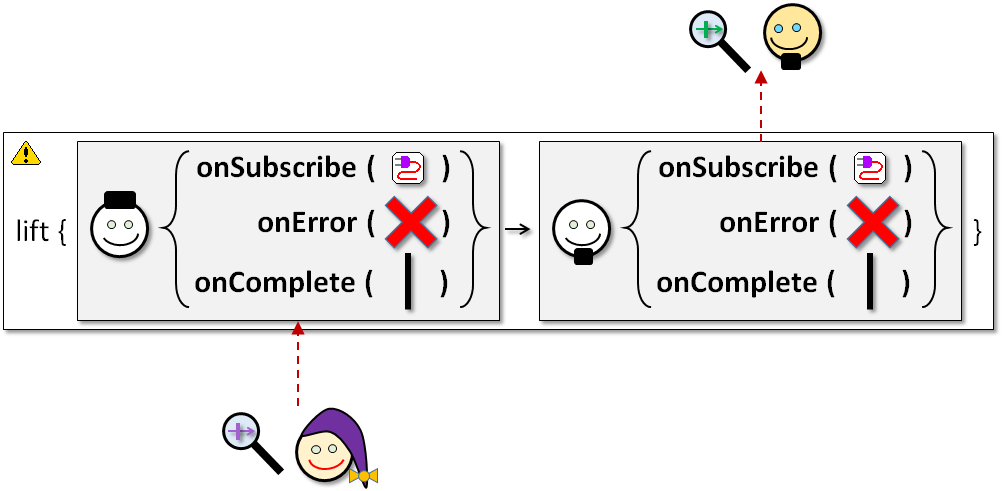
Generally, such a new
CompletableObserverwill wrap the downstream'sCompletableObserverand forwards theonErrorandonCompleteevents from the upstream directly or according to the emission pattern the custom operator's business logic requires. In addition, such operator can intercept the flow control calls ofdisposeandisDisposedthat would have traveled upstream and perform additional actions depending on the same business logic requirements.Example:
// Step 1: Create the consumer type that will be returned by the CompletableOperator.apply(): public final class CustomCompletableObserver implements CompletableObserver, Disposable { // The downstream's CompletableObserver that will receive the onXXX events final CompletableObserver downstream; // The connection to the upstream source that will call this class' onXXX methods Disposable upstream; // The constructor takes the downstream subscriber and usually any other parameters public CustomCompletableObserver(CompletableObserver downstream) { this.downstream = downstream; } // In the subscription phase, the upstream sends a Disposable to this class // and subsequently this class has to send a Disposable to the downstream. // Note that relaying the upstream's Disposable directly is not allowed in RxJava @Override public void onSubscribe(Disposable d) { if (upstream != null) { d.dispose(); } else { upstream = d; downstream.onSubscribe(this); } } // Some operators may handle the upstream's error while others // could just forward it to the downstream. @Override public void onError(Throwable throwable) { downstream.onError(throwable); } // When the upstream completes, usually the downstream should complete as well. // In completable, this could also mean doing some side-effects @Override public void onComplete() { System.out.println("Sequence completed"); downstream.onComplete(); } // Some operators may use their own resources which should be cleaned up if // the downstream disposes the flow before it completed. Operators without // resources can simply forward the dispose to the upstream. // In some cases, a disposed flag may be set by this method so that other parts // of this class may detect the dispose and stop sending events // to the downstream. @Override public void dispose() { upstream.dispose(); } // Some operators may simply forward the call to the upstream while others // can return the disposed flag set in dispose(). @Override public boolean isDisposed() { return upstream.isDisposed(); } } // Step 2: Create a class that implements the CompletableOperator interface and // returns the custom consumer type from above in its apply() method. // Such class may define additional parameters to be submitted to // the custom consumer type. final class CustomCompletableOperator implements CompletableOperator { @Override public CompletableObserver apply(CompletableObserver upstream) { return new CustomCompletableObserver(upstream); } } // Step 3: Apply the custom operator via lift() in a flow by creating an instance of it // or reusing an existing one. Completable.complete() .lift(new CustomCompletableOperator()) .test() .assertResult();Creating custom operators can be complicated and it is recommended one consults the RxJava wiki: Writing operators page about the tools, requirements, rules, considerations and pitfalls of implementing them.
Note that implementing custom operators via this
lift()method adds slightly more overhead by requiring an additional allocation and indirection per assembled flows. Instead, extending the abstractCompletableclass and creating aCompletableTransformerwith it is recommended.Note also that it is not possible to stop the subscription phase in
lift()as theapply()method requires a non-nullCompletableObserverinstance to be returned, which is then unconditionally subscribed to the upstreamCompletable. For example, if the operator decided there is no reason to subscribe to the upstream source because of some optimization possibility or a failure to prepare the operator, it still has to return aCompletableObserverthat should immediately dispose the upstream'sDisposablein itsonSubscribemethod. Again, using aCompletableTransformerand extending theCompletableis a better option assubscribeActual(io.reactivex.rxjava3.core.CompletableObserver)can decide to not subscribe to its upstream after all.- Scheduler:
liftdoes not operate by default on a particularScheduler, however, theCompletableOperatormay use aSchedulerto support its own asynchronous behavior.
- Parameters:
onLift- theCompletableOperatorthat receives the downstream'sCompletableObserverand should return aCompletableObserverwith custom behavior to be used as the consumer for the currentCompletable.- Returns:
- the new Completable instance
- See Also:
- RxJava wiki: Writing operators,
compose(CompletableTransformer)
-
materialize
@CheckReturnValue @SchedulerSupport(value="none") @NonNull public final <T> @NonNull Single<Notification<T>> materialize()
Maps the signal types of this Completable into aNotificationof the same kind and emits it as a single success value to downstream.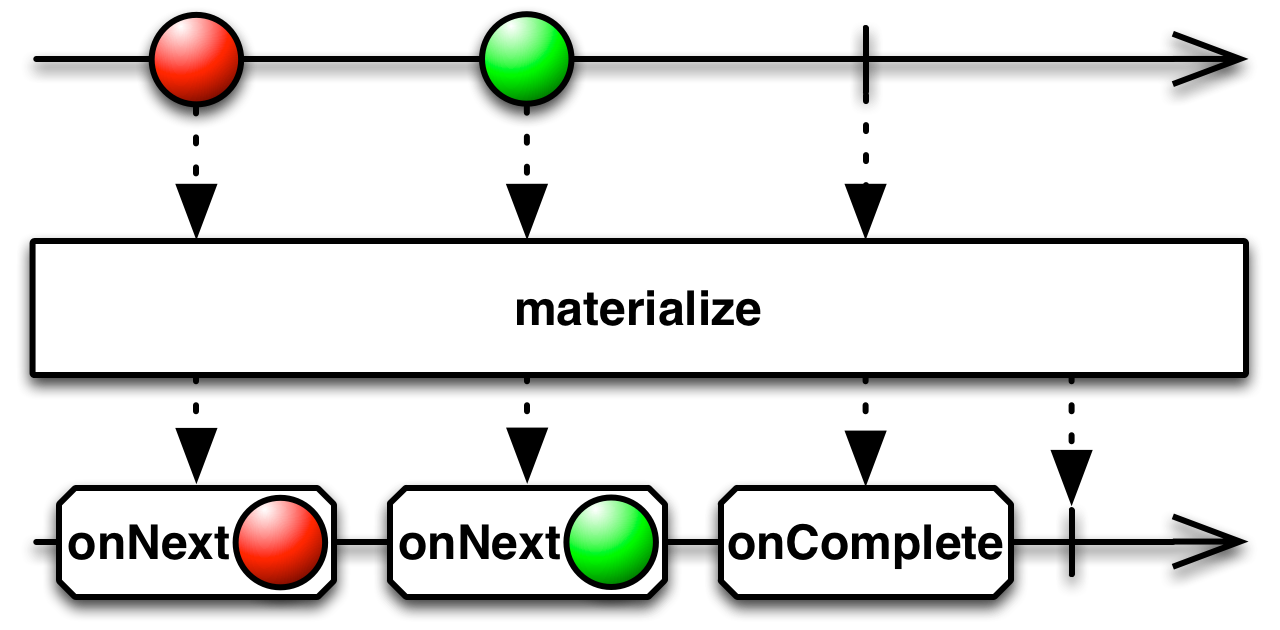
- Scheduler:
materializedoes not operate by default on a particularScheduler.
History: 2.2.4 - experimental
- Type Parameters:
T- the intended target element type of the notification- Returns:
- the new Single instance
- Since:
- 3.0.0
- See Also:
Single.dematerialize(Function)
-
mergeWith
@CheckReturnValue @NonNull @SchedulerSupport(value="none") public final @NonNull Completable mergeWith(@NonNull @NonNull CompletableSource other)
Returns a Completable which subscribes to this and the other Completable and completes when both of them complete or one emits an error.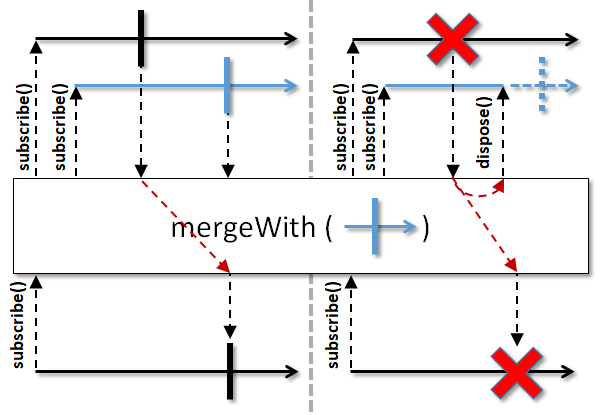
- Scheduler:
mergeWithdoes not operate by default on a particularScheduler.
- Parameters:
other- the other Completable instance- Returns:
- the new Completable instance
- Throws:
NullPointerException- if other is null
-
observeOn
@CheckReturnValue @NonNull @SchedulerSupport(value="custom") public final @NonNull Completable observeOn(@NonNull @NonNull Scheduler scheduler)
Returns a Completable which emits the terminal events from the thread of the specified scheduler.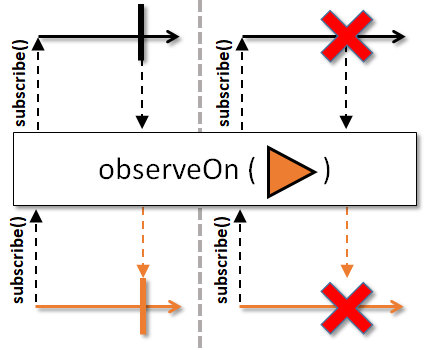
- Scheduler:
observeOnoperates on aScheduleryou specify.
- Parameters:
scheduler- the scheduler to emit terminal events on- Returns:
- the new Completable instance
- Throws:
NullPointerException- if scheduler is null
-
onErrorComplete
@CheckReturnValue @SchedulerSupport(value="none") @NonNull public final @NonNull Completable onErrorComplete()
Returns a Completable instance that if this Completable emits an error, it will emit an onComplete and swallow the throwable.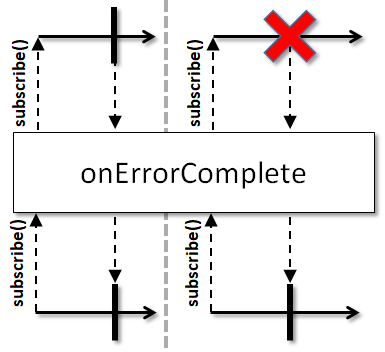
- Scheduler:
onErrorCompletedoes not operate by default on a particularScheduler.
- Returns:
- the new Completable instance
-
onErrorComplete
@CheckReturnValue @NonNull @SchedulerSupport(value="none") public final @NonNull Completable onErrorComplete(@NonNull @NonNull Predicate<? super Throwable> predicate)
Returns a Completable instance that if this Completable emits an error and the predicate returns true, it will emit an onComplete and swallow the throwable.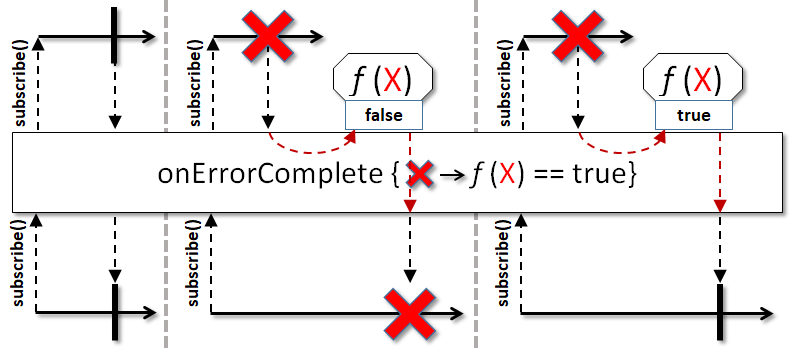
- Scheduler:
onErrorCompletedoes not operate by default on a particularScheduler.
- Parameters:
predicate- the predicate to call when an Throwable is emitted which should return true if the Throwable should be swallowed and replaced with an onComplete.- Returns:
- the new Completable instance
-
onErrorResumeNext
@CheckReturnValue @NonNull @SchedulerSupport(value="none") public final @NonNull Completable onErrorResumeNext(@NonNull @NonNull Function<? super Throwable,? extends CompletableSource> errorMapper)
Returns a Completable instance that when encounters an error from this Completable, calls the specified mapper function that returns another Completable instance for it and resumes the execution with it.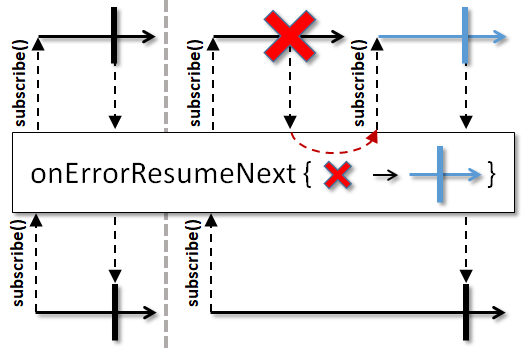
- Scheduler:
onErrorResumeNextdoes not operate by default on a particularScheduler.
- Parameters:
errorMapper- the mapper function that takes the error and should return a Completable as continuation.- Returns:
- the new Completable instance
-
onTerminateDetach
@CheckReturnValue @SchedulerSupport(value="none") @NonNull public final @NonNull Completable onTerminateDetach()
Nulls out references to the upstream producer and downstream CompletableObserver if the sequence is terminated or downstream calls dispose().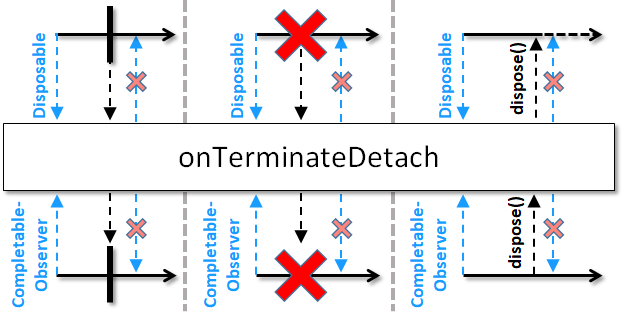
- Scheduler:
onTerminateDetachdoes not operate by default on a particularScheduler.
History: 2.1.5 - experimental
- Returns:
- a Completable which nulls out references to the upstream producer and downstream CompletableObserver if the sequence is terminated or downstream calls dispose()
- Since:
- 2.2
-
repeat
@CheckReturnValue @SchedulerSupport(value="none") @NonNull public final @NonNull Completable repeat()
Returns a Completable that repeatedly subscribes to this Completable until disposed.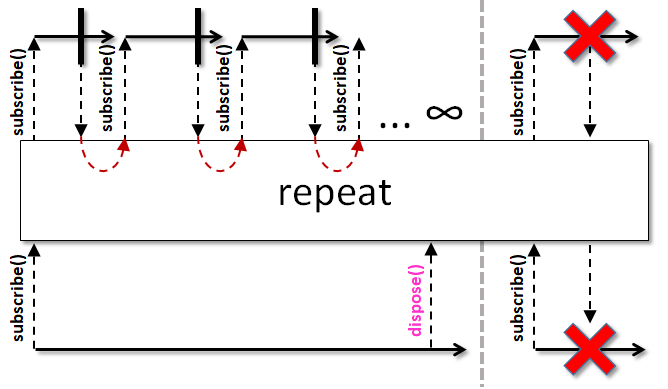
- Scheduler:
repeatdoes not operate by default on a particularScheduler.
- Returns:
- the new Completable instance
-
repeat
@CheckReturnValue @SchedulerSupport(value="none") @NonNull public final @NonNull Completable repeat(long times)
Returns a Completable that subscribes repeatedly at most the given times to this Completable.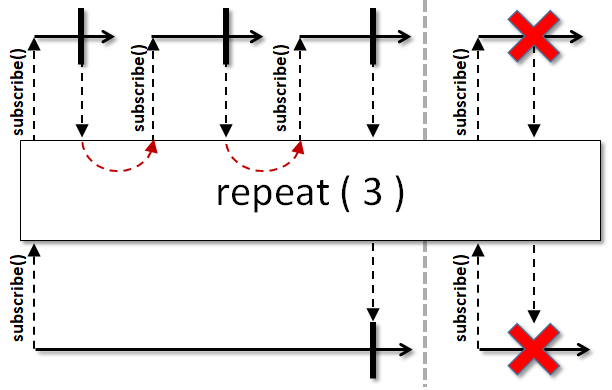
- Scheduler:
repeatdoes not operate by default on a particularScheduler.
- Parameters:
times- the number of times the resubscription should happen- Returns:
- the new Completable instance
- Throws:
IllegalArgumentException- if times is less than zero
-
repeatUntil
@CheckReturnValue @SchedulerSupport(value="none") @NonNull public final @NonNull Completable repeatUntil(@NonNull @NonNull BooleanSupplier stop)
Returns a Completable that repeatedly subscribes to this Completable so long as the given stop supplier returns false.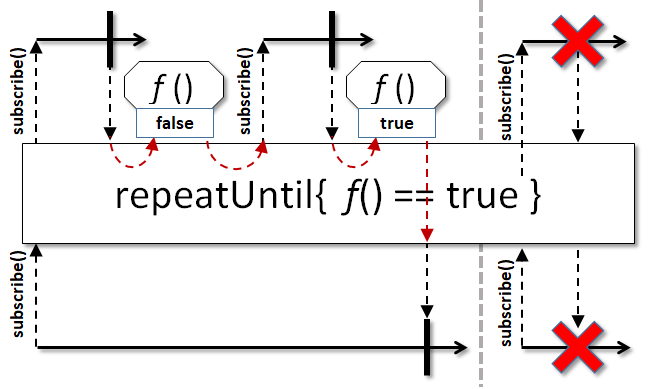
- Scheduler:
repeatUntildoes not operate by default on a particularScheduler.
- Parameters:
stop- the supplier that should return true to stop resubscribing.- Returns:
- the new Completable instance
- Throws:
NullPointerException- if stop is null
-
repeatWhen
@CheckReturnValue @SchedulerSupport(value="none") @NonNull public final @NonNull Completable repeatWhen(@NonNull @NonNull Function<? super Flowable<Object>,? extends Publisher<?>> handler)
Returns a Completable instance that repeats when the Publisher returned by the handler emits an item or completes when this Publisher emits a completed event.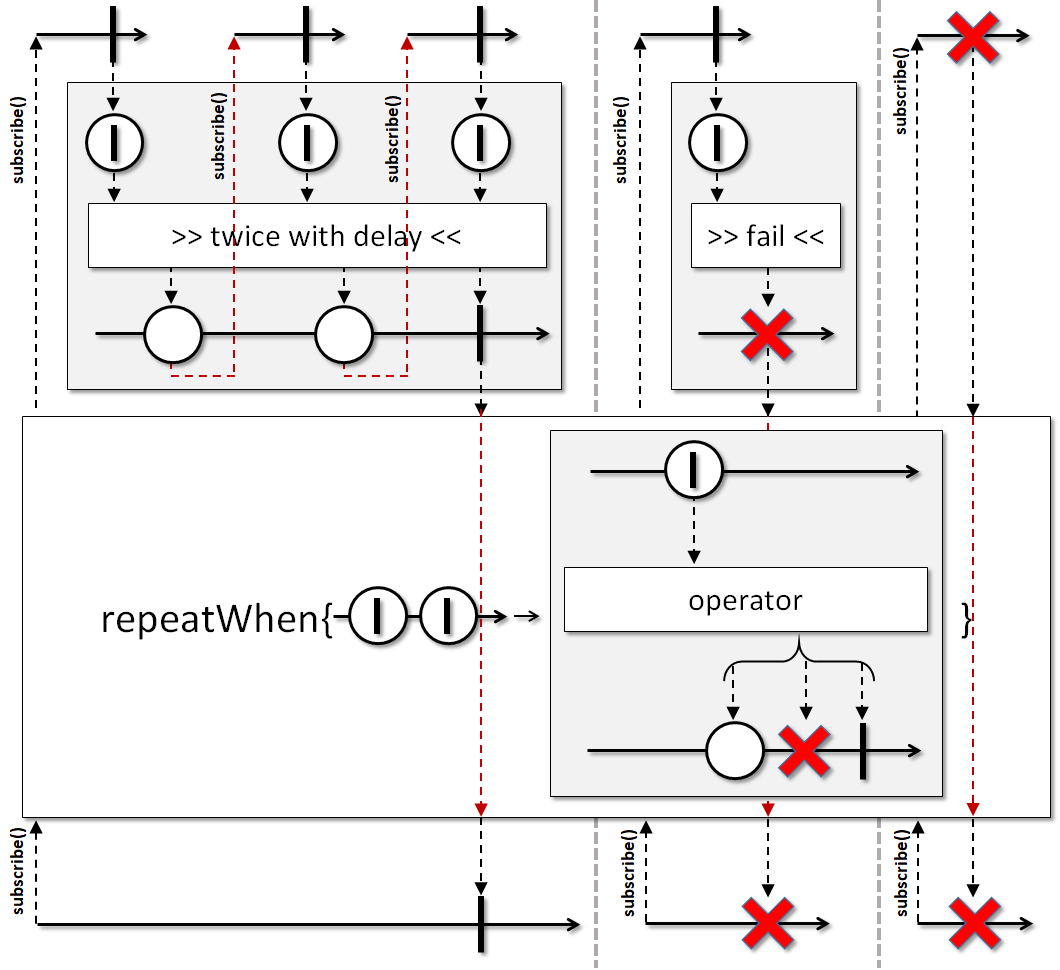
- Scheduler:
repeatWhendoes not operate by default on a particularScheduler.
- Parameters:
handler- the function that transforms the stream of values indicating the completion of this Completable and returns a Publisher that emits items for repeating or completes to indicate the repetition should stop- Returns:
- the new Completable instance
- Throws:
NullPointerException- if stop is null
-
retry
@CheckReturnValue @SchedulerSupport(value="none") @NonNull public final @NonNull Completable retry()
Returns a Completable that retries this Completable as long as it emits an onError event.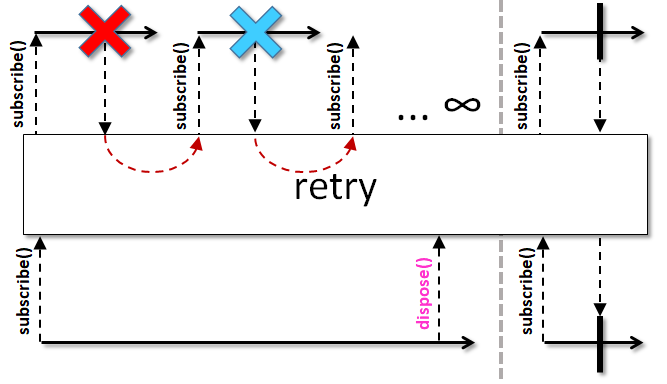
- Scheduler:
retrydoes not operate by default on a particularScheduler.
- Returns:
- the new Completable instance
-
retry
@CheckReturnValue @SchedulerSupport(value="none") @NonNull public final @NonNull Completable retry(@NonNull @NonNull BiPredicate<? super Integer,? super Throwable> predicate)
Returns a Completable that retries this Completable in case of an error as long as the predicate returns true.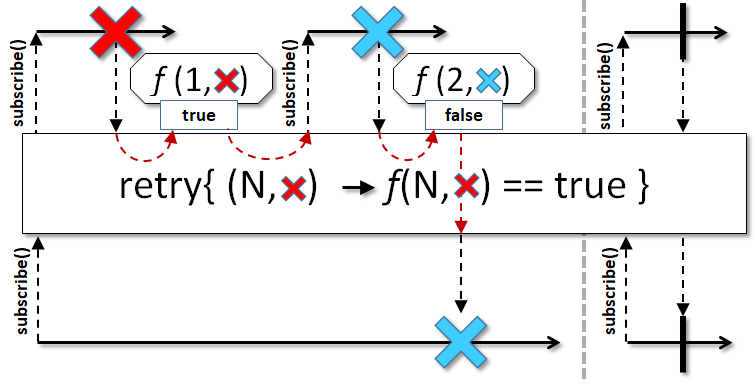
- Scheduler:
retrydoes not operate by default on a particularScheduler.
- Parameters:
predicate- the predicate called when this emits an error with the repeat count and the latest exception and should return true to retry.- Returns:
- the new Completable instance
-
retry
@CheckReturnValue @SchedulerSupport(value="none") @NonNull public final @NonNull Completable retry(long times)
Returns a Completable that when this Completable emits an error, retries at most the given number of times before giving up and emitting the last error.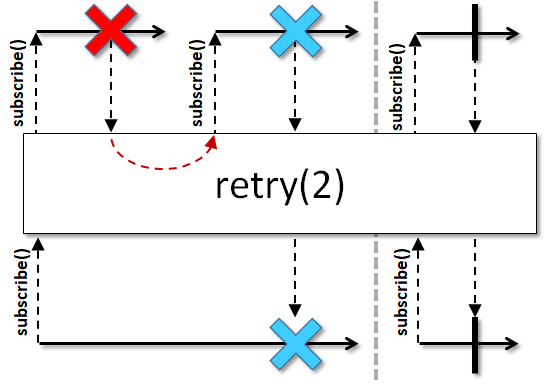
- Scheduler:
retrydoes not operate by default on a particularScheduler.
- Parameters:
times- the number of times to resubscribe if the current Completable fails- Returns:
- the new Completable instance
- Throws:
IllegalArgumentException- if times is negative
-
retry
@CheckReturnValue @SchedulerSupport(value="none") @NonNull public final @NonNull Completable retry(long times, @NonNull @NonNull Predicate<? super Throwable> predicate)
Returns a Completable that when this Completable emits an error, retries at most times or until the predicate returns false, whichever happens first and emitting the last error.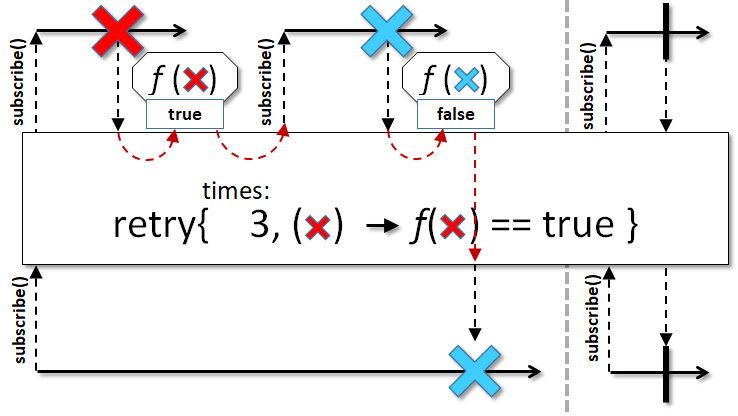
- Scheduler:
retrydoes not operate by default on a particularScheduler.
History: 2.1.8 - experimental
- Parameters:
times- the number of times to resubscribe if the current Completable failspredicate- the predicate that is called with the latest throwable and should return true to indicate the returned Completable should resubscribe to this Completable.- Returns:
- the new Completable instance
- Throws:
NullPointerException- if predicate is nullIllegalArgumentException- if times is negative- Since:
- 2.2
-
retry
@CheckReturnValue @SchedulerSupport(value="none") @NonNull public final @NonNull Completable retry(@NonNull @NonNull Predicate<? super Throwable> predicate)
Returns a Completable that when this Completable emits an error, calls the given predicate with the latest exception to decide whether to resubscribe to this or not.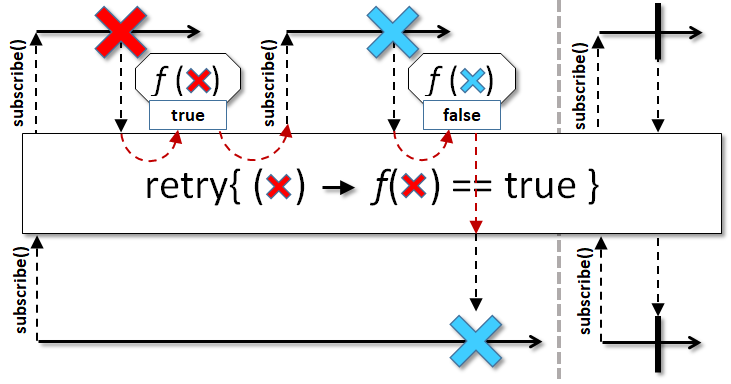
- Scheduler:
retrydoes not operate by default on a particularScheduler.
- Parameters:
predicate- the predicate that is called with the latest throwable and should return true to indicate the returned Completable should resubscribe to this Completable.- Returns:
- the new Completable instance
- Throws:
NullPointerException- if predicate is null
-
retryWhen
@CheckReturnValue @SchedulerSupport(value="none") @NonNull public final @NonNull Completable retryWhen(@NonNull @NonNull Function<? super Flowable<Throwable>,? extends Publisher<?>> handler)
Returns a Completable which given a Publisher and when this Completable emits an error, delivers that error through a Flowable and the Publisher should signal a value indicating a retry in response or a terminal event indicating a termination.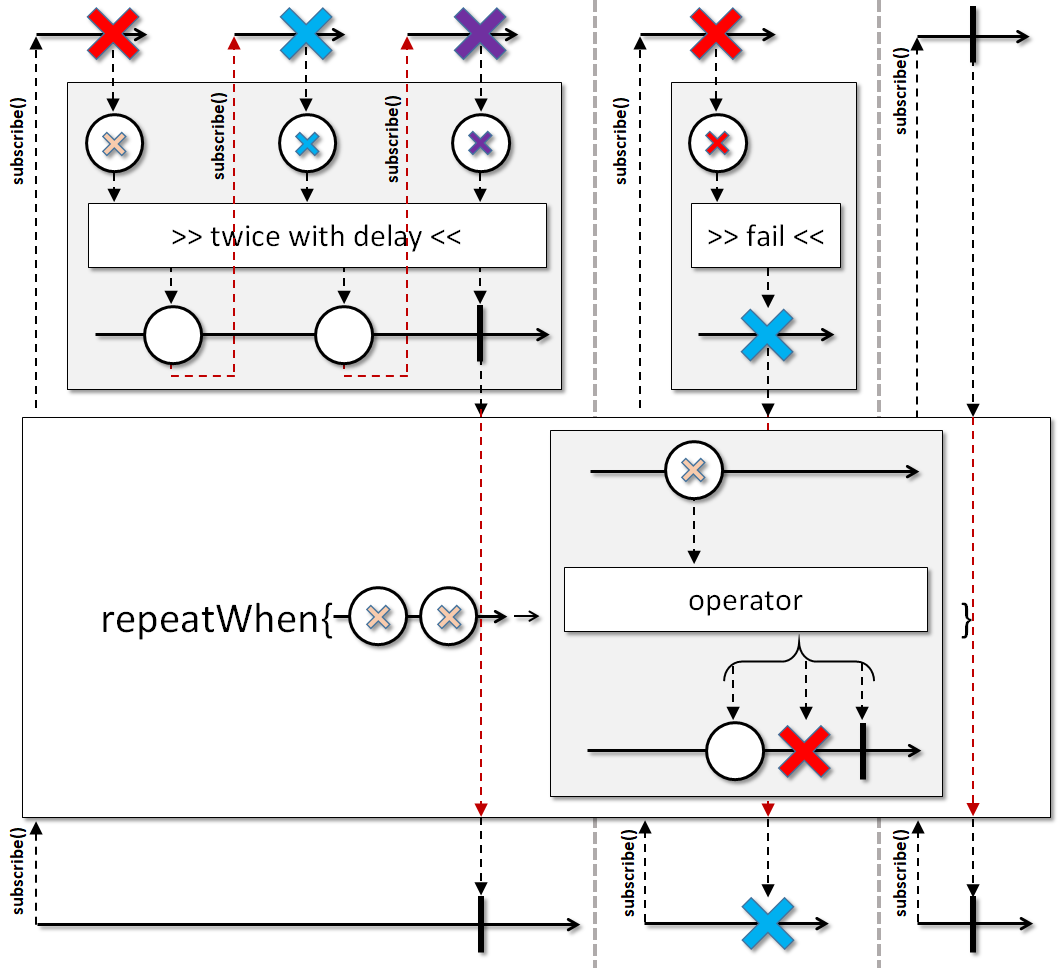
Note that the inner
Publisherreturned by the handler function should signal eitheronNext,onErrororonCompletein response to the receivedThrowableto indicate the operator should retry or terminate. If the upstream to the operator is asynchronous, signalling onNext followed by onComplete immediately may result in the sequence to be completed immediately. Similarly, if this innerPublishersignalsonErrororonCompletewhile the upstream is active, the sequence is terminated with the same signal immediately.The following example demonstrates how to retry an asynchronous source with a delay:
Completable.timer(1, TimeUnit.SECONDS) .doOnSubscribe(s -> System.out.println("subscribing")) .doOnComplete(() -> { throw new RuntimeException(); }) .retryWhen(errors -> { AtomicInteger counter = new AtomicInteger(); return errors .takeWhile(e -> counter.getAndIncrement() != 3) .flatMap(e -> { System.out.println("delay retry by " + counter.get() + " second(s)"); return Flowable.timer(counter.get(), TimeUnit.SECONDS); }); }) .blockingAwait();- Scheduler:
retryWhendoes not operate by default on a particularScheduler.
- Parameters:
handler- the handler that receives a Flowable delivering Throwables and should return a Publisher that emits items to indicate retries or emits terminal events to indicate termination.- Returns:
- the new Completable instance
- Throws:
NullPointerException- if handler is null
-
startWith
@CheckReturnValue @NonNull @SchedulerSupport(value="none") public final @NonNull Completable startWith(@NonNull @NonNull CompletableSource other)
Returns a Completable which first runs the other Completable then this completable if the other completed normally.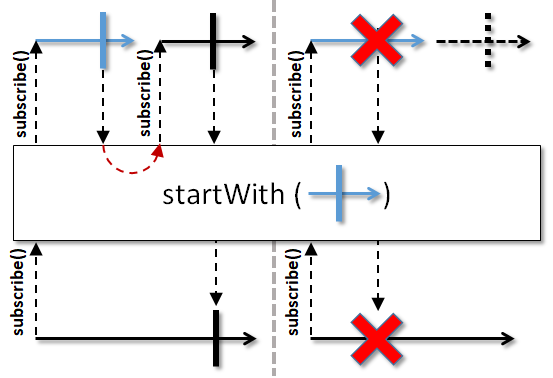
- Scheduler:
startWithdoes not operate by default on a particularScheduler.
- Parameters:
other- the other completable to run first- Returns:
- the new Completable instance
- Throws:
NullPointerException- if other is null
-
startWith
@CheckReturnValue @NonNull @SchedulerSupport(value="none") public final <T> @NonNull Observable<T> startWith(@NonNull @NonNull ObservableSource<T> other)
Returns an Observable which first delivers the events of the other Observable then runs this CompletableConsumable.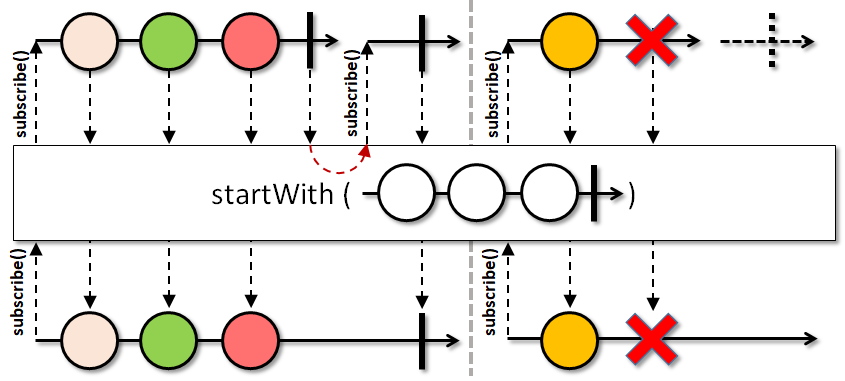
- Scheduler:
startWithdoes not operate by default on a particularScheduler.
- Type Parameters:
T- the value type- Parameters:
other- the other Observable to run first- Returns:
- the new Observable instance
- Throws:
NullPointerException- if other is null
-
startWith
@CheckReturnValue @NonNull @BackpressureSupport(value=FULL) @SchedulerSupport(value="none") public final <T> @NonNull Flowable<T> startWith(@NonNull @NonNull Publisher<T> other)
Returns a Flowable which first delivers the events of the other Publisher then runs this Completable.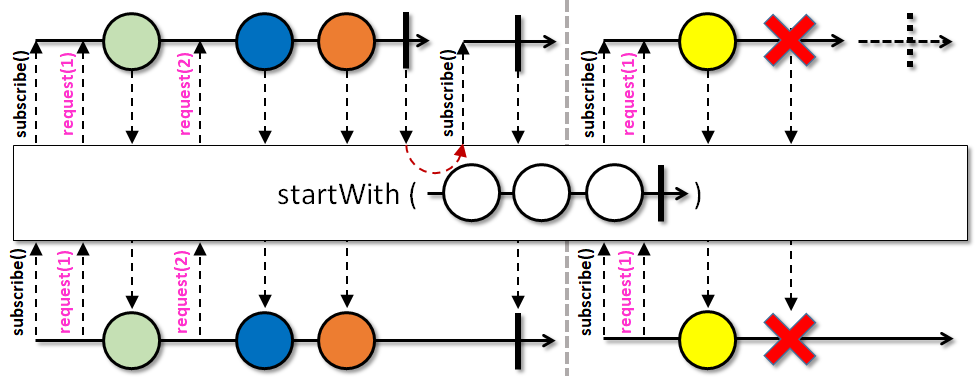
- Backpressure:
- The returned
Flowablehonors the backpressure of the downstream consumer and expects the otherPublisherto honor it as well. - Scheduler:
startWithdoes not operate by default on a particularScheduler.
- Type Parameters:
T- the value type- Parameters:
other- the other Publisher to run first- Returns:
- the new Flowable instance
- Throws:
NullPointerException- if other is null
-
hide
@CheckReturnValue @SchedulerSupport(value="none") @NonNull public final @NonNull Completable hide()
Hides the identity of this Completable and its Disposable.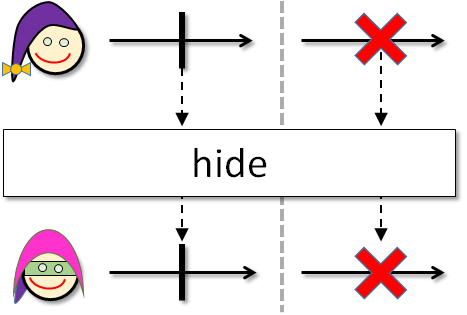
Allows preventing certain identity-based optimizations (fusion).
- Scheduler:
hidedoes not operate by default on a particularScheduler.
History: 2.0.5 - experimental
- Returns:
- the new Completable instance
- Since:
- 2.1
-
subscribe
@SchedulerSupport(value="none") @NonNull public final @NonNull Disposable subscribe()
Subscribes to this CompletableConsumable and returns a Disposable which can be used to dispose the subscription.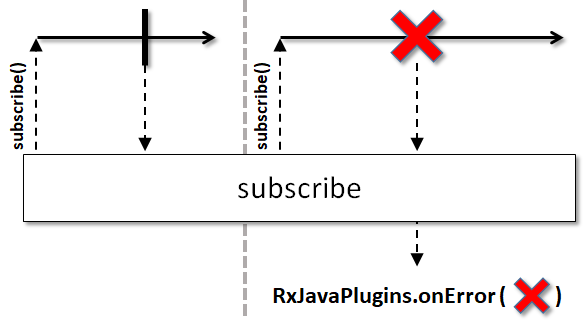
- Scheduler:
subscribedoes not operate by default on a particularScheduler.
- Returns:
- the Disposable that allows disposing the subscription
-
subscribe
@SchedulerSupport(value="none") public final void subscribe(@NonNull @NonNull CompletableObserver observer)
Description copied from interface:CompletableSourceSubscribes the givenCompletableObserverto thisCompletableSourceinstance.- Specified by:
subscribein interfaceCompletableSource- Parameters:
observer- theCompletableObserver, notnull
-
subscribeActual
protected abstract void subscribeActual(@NonNull @NonNull CompletableObserver observer)
Implement this method to handle the incomingCompletableObservers and perform the business logic in your operator.There is no need to call any of the plugin hooks on the current
Completableinstance or theCompletableObserver; all hooks and basic safeguards have been applied bysubscribe(CompletableObserver)before this method gets called.- Parameters:
observer- the CompletableObserver instance, never null
-
subscribeWith
@CheckReturnValue @SchedulerSupport(value="none") @NonNull public final <E extends CompletableObserver> E subscribeWith(E observer)
Subscribes a given CompletableObserver (subclass) to this Completable and returns the given CompletableObserver as is.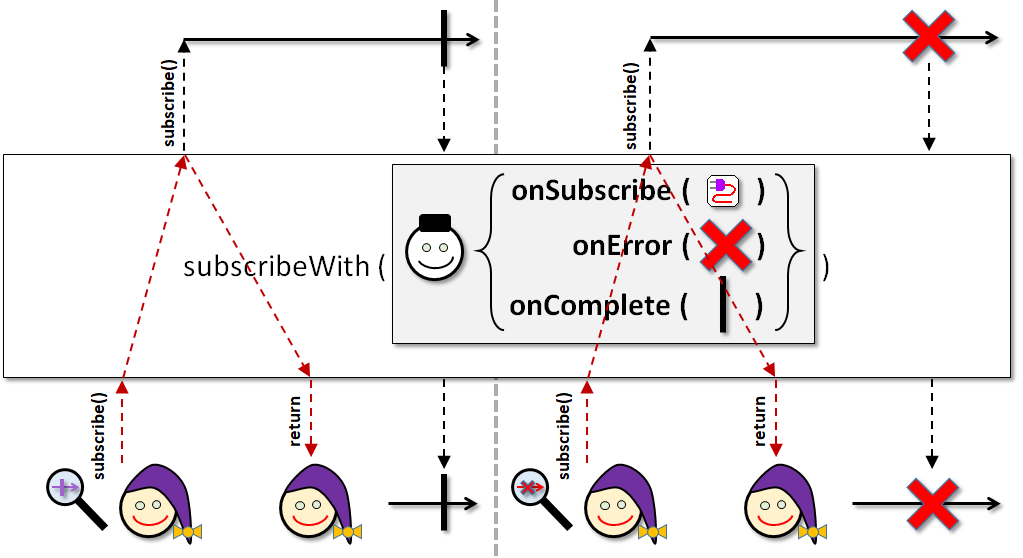
Usage example:
Completable source = Completable.complete().delay(1, TimeUnit.SECONDS); CompositeDisposable composite = new CompositeDisposable(); DisposableCompletableObserver ds = new DisposableCompletableObserver() { // ... }; composite.add(source.subscribeWith(ds));- Scheduler:
subscribeWithdoes not operate by default on a particularScheduler.
- Type Parameters:
E- the type of the CompletableObserver to use and return- Parameters:
observer- the CompletableObserver (subclass) to use and return, not null- Returns:
- the input
observer - Throws:
NullPointerException- ifobserveris null- Since:
- 2.0
-
subscribe
@CheckReturnValue @NonNull @SchedulerSupport(value="none") public final @NonNull Disposable subscribe(@NonNull @NonNull Action onComplete, @NonNull @NonNull Consumer<? super Throwable> onError)
Subscribes to this Completable and calls back either the onError or onComplete functions.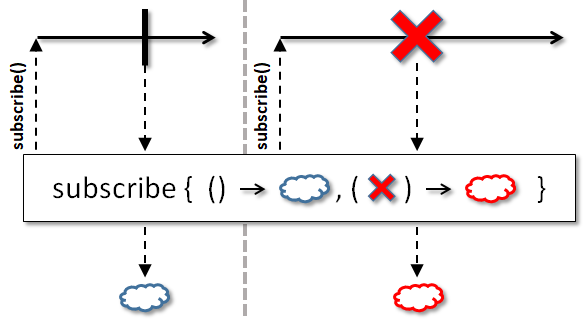
- Scheduler:
subscribedoes not operate by default on a particularScheduler.
- Parameters:
onComplete- the runnable that is called if the Completable completes normallyonError- the consumer that is called if this Completable emits an error- Returns:
- the Disposable that can be used for disposing the subscription asynchronously
- Throws:
NullPointerException- if either callback is null
-
subscribe
@CheckReturnValue @NonNull @SchedulerSupport(value="none") public final @NonNull Disposable subscribe(@NonNull @NonNull Action onComplete)
Subscribes to this Completable and calls the given Action when this Completable completes normally.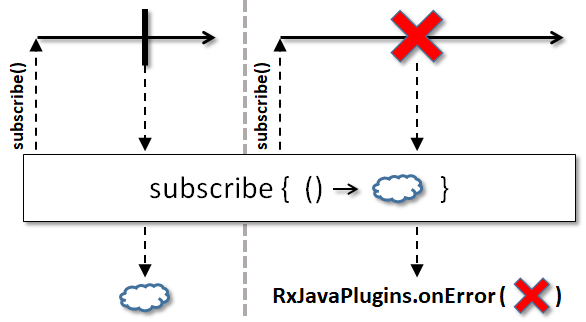
If the Completable emits an error, it is wrapped into an
OnErrorNotImplementedExceptionand routed to the RxJavaPlugins.onError handler.- Scheduler:
subscribedoes not operate by default on a particularScheduler.
- Parameters:
onComplete- the runnable called when this Completable completes normally- Returns:
- the Disposable that allows disposing the subscription
-
subscribeOn
@CheckReturnValue @NonNull @SchedulerSupport(value="custom") public final @NonNull Completable subscribeOn(@NonNull @NonNull Scheduler scheduler)
Returns a Completable which subscribes the child subscriber on the specified scheduler, making sure the subscription side-effects happen on that specific thread of the scheduler.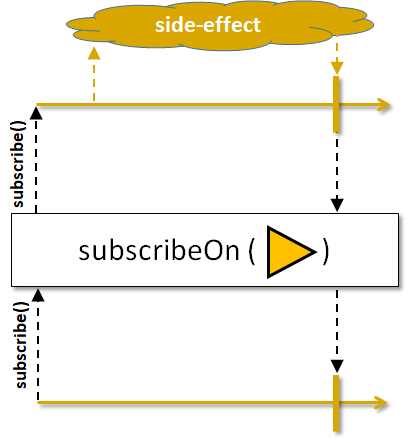
- Scheduler:
subscribeOnoperates on aScheduleryou specify.
- Parameters:
scheduler- the Scheduler to subscribe on- Returns:
- the new Completable instance
- Throws:
NullPointerException- if scheduler is null
-
takeUntil
@CheckReturnValue @NonNull @SchedulerSupport(value="none") public final @NonNull Completable takeUntil(@NonNull @NonNull CompletableSource other)
Terminates the downstream if this or the otherCompletableterminates (wins the termination race) while disposing the connection to the losing source.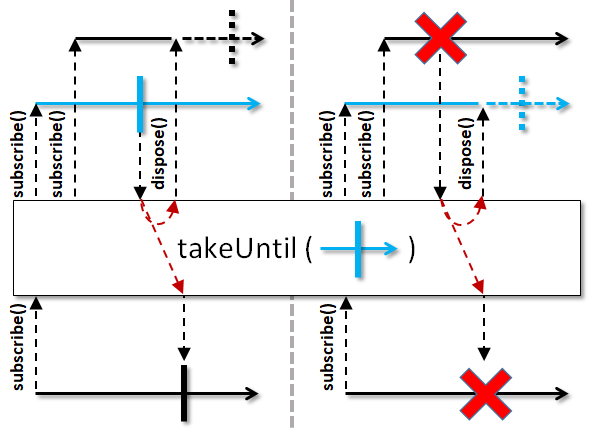
- Scheduler:
takeUntildoes not operate by default on a particularScheduler.- Error handling:
- If both this and the other sources signal an error, only one of the errors
is signaled to the downstream and the other error is signaled to the global
error handler via
RxJavaPlugins.onError(Throwable).
History: 2.1.17 - experimental
- Parameters:
other- the other completable source to observe for the terminal signals- Returns:
- the new Completable instance
- Since:
- 2.2
-
timeout
@CheckReturnValue @SchedulerSupport(value="io.reactivex:computation") @NonNull public final @NonNull Completable timeout(long timeout, @NonNull @NonNull TimeUnit unit)
Returns a Completable that runs this Completable and emits a TimeoutException in case this Completable doesn't complete within the given time.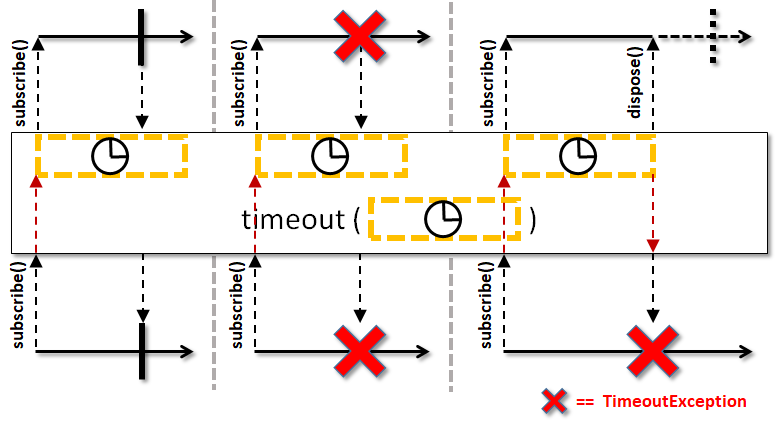
- Scheduler:
timeoutsignals the TimeoutException on thecomputationScheduler.
- Parameters:
timeout- the timeout valueunit- the timeout unit- Returns:
- the new Completable instance
- Throws:
NullPointerException- if unit is null
-
timeout
@CheckReturnValue @NonNull @SchedulerSupport(value="io.reactivex:computation") public final @NonNull Completable timeout(long timeout, @NonNull @NonNull TimeUnit unit, @NonNull @NonNull CompletableSource other)
Returns a Completable that runs this Completable and switches to the other Completable in case this Completable doesn't complete within the given time.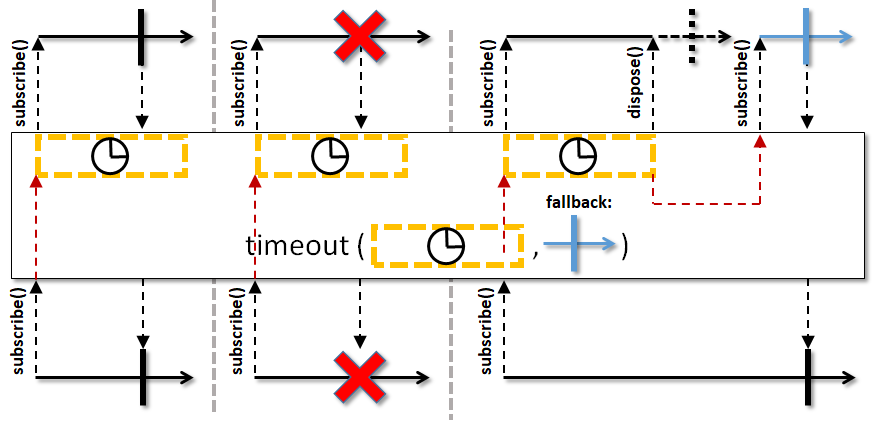
- Scheduler:
timeoutsubscribes to the other CompletableSource on thecomputationScheduler.
- Parameters:
timeout- the timeout valueunit- the timeout unitother- the other Completable instance to switch to in case of a timeout- Returns:
- the new Completable instance
- Throws:
NullPointerException- if unit or other is null
-
timeout
@CheckReturnValue @SchedulerSupport(value="custom") @NonNull public final @NonNull Completable timeout(long timeout, @NonNull @NonNull TimeUnit unit, @NonNull @NonNull Scheduler scheduler)
Returns a Completable that runs this Completable and emits a TimeoutException in case this Completable doesn't complete within the given time while "waiting" on the specified Scheduler.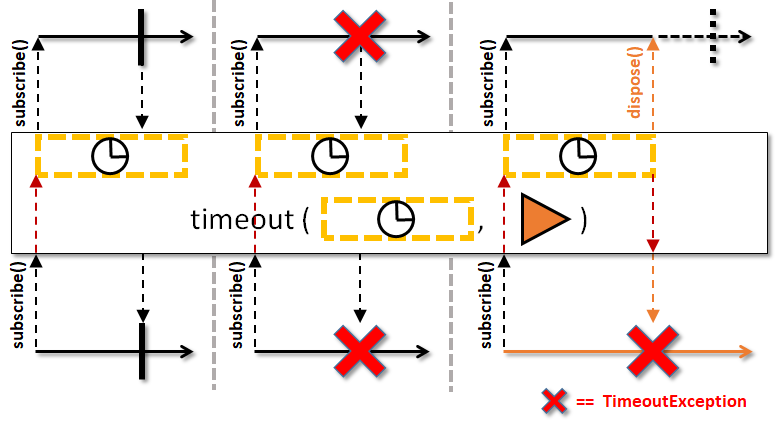
- Scheduler:
timeoutsignals the TimeoutException on theScheduleryou specify.
- Parameters:
timeout- the timeout valueunit- the timeout unitscheduler- the scheduler to use to wait for completion- Returns:
- the new Completable instance
- Throws:
NullPointerException- if unit or scheduler is null
-
timeout
@CheckReturnValue @NonNull @SchedulerSupport(value="custom") public final @NonNull Completable timeout(long timeout, @NonNull @NonNull TimeUnit unit, @NonNull @NonNull Scheduler scheduler, @NonNull @NonNull CompletableSource other)
Returns a Completable that runs this Completable and switches to the other Completable in case this Completable doesn't complete within the given time while "waiting" on the specified scheduler.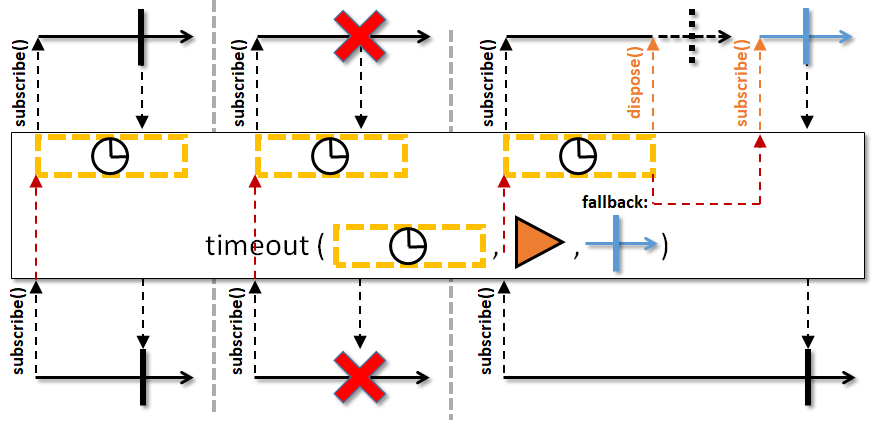
- Scheduler:
timeoutsubscribes to the other CompletableSource on theScheduleryou specify.
- Parameters:
timeout- the timeout valueunit- the timeout unitscheduler- the scheduler to use to wait for completionother- the other Completable instance to switch to in case of a timeout- Returns:
- the new Completable instance
- Throws:
NullPointerException- if unit, scheduler or other is null
-
to
@CheckReturnValue @SchedulerSupport(value="none") public final <R> R to(@NonNull @NonNull CompletableConverter<? extends R> converter)
Calls the specified converter function during assembly time and returns its resulting value.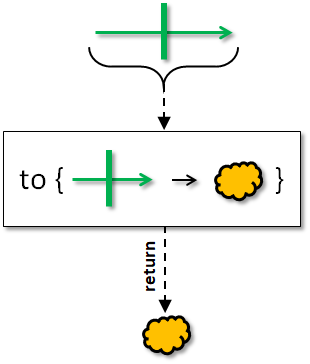
This allows fluent conversion to any other type.
- Scheduler:
todoes not operate by default on a particularScheduler.
History: 2.1.7 - experimental
- Type Parameters:
R- the resulting object type- Parameters:
converter- the function that receives the current Completable instance and returns a value- Returns:
- the converted value
- Throws:
NullPointerException- if converter is null- Since:
- 2.2
-
toFlowable
@CheckReturnValue @BackpressureSupport(value=FULL) @SchedulerSupport(value="none") @NonNull public final <T> @NonNull Flowable<T> toFlowable()
Returns a Flowable which when subscribed to subscribes to this Completable and relays the terminal events to the subscriber.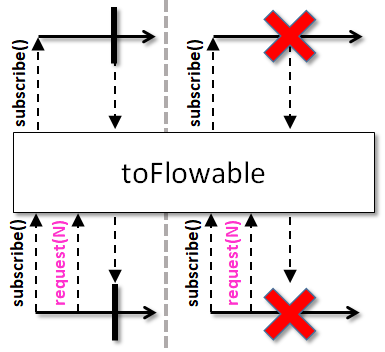
- Backpressure:
- The returned
Flowablehonors the backpressure of the downstream consumer. - Scheduler:
toFlowabledoes not operate by default on a particularScheduler.
- Type Parameters:
T- the value type- Returns:
- the new Flowable instance
-
toMaybe
@CheckReturnValue @SchedulerSupport(value="none") @NonNull public final <T> @NonNull Maybe<T> toMaybe()
Converts this Completable into aMaybe.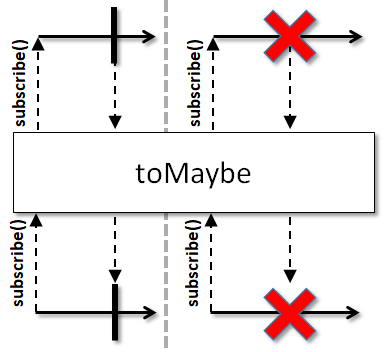
- Scheduler:
toMaybedoes not operate by default on a particularScheduler.
- Type Parameters:
T- the value type- Returns:
- a
Maybethat only callsonCompleteoronError, based on which one is called by the source Completable.
-
toObservable
@CheckReturnValue @SchedulerSupport(value="none") @NonNull public final <T> @NonNull Observable<T> toObservable()
Returns an Observable which when subscribed to subscribes to this Completable and relays the terminal events to the subscriber.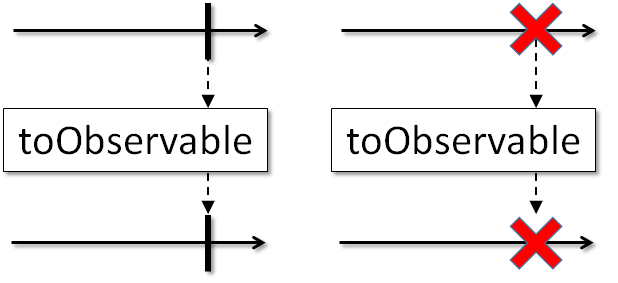
- Scheduler:
toObservabledoes not operate by default on a particularScheduler.
- Type Parameters:
T- the value type- Returns:
- the new Observable created
-
toSingle
@CheckReturnValue @NonNull @SchedulerSupport(value="none") public final <T> @NonNull Single<T> toSingle(@NonNull @NonNull Supplier<? extends T> completionValueSupplier)
Converts this Completable into a Single which when this Completable completes normally, calls the given supplier and emits its returned value through onSuccess.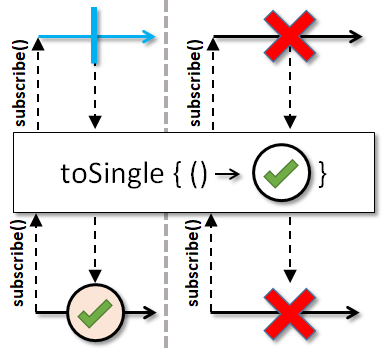
- Scheduler:
toSingledoes not operate by default on a particularScheduler.
- Type Parameters:
T- the value type- Parameters:
completionValueSupplier- the value supplier called when this Completable completes normally- Returns:
- the new Single instance
- Throws:
NullPointerException- if completionValueSupplier is null
-
toSingleDefault
@CheckReturnValue @NonNull @SchedulerSupport(value="none") public final <T> @NonNull Single<T> toSingleDefault(T completionValue)
Converts this Completable into a Single which when this Completable completes normally, emits the given value through onSuccess.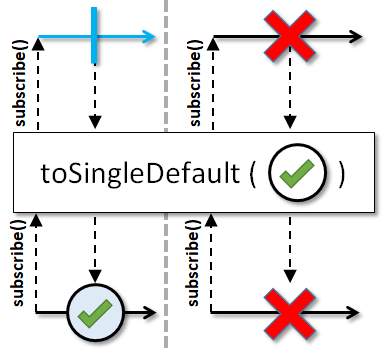
- Scheduler:
toSingleDefaultdoes not operate by default on a particularScheduler.
- Type Parameters:
T- the value type- Parameters:
completionValue- the value to emit when this Completable completes normally- Returns:
- the new Single instance
- Throws:
NullPointerException- if completionValue is null
-
unsubscribeOn
@CheckReturnValue @NonNull @SchedulerSupport(value="custom") public final @NonNull Completable unsubscribeOn(@NonNull @NonNull Scheduler scheduler)
Returns a Completable which makes sure when a subscriber disposes the subscription, the dispose is called on the specified scheduler.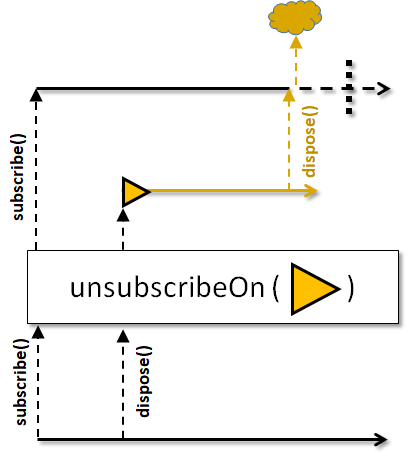
- Scheduler:
unsubscribeOncalls dispose() of the upstream on theScheduleryou specify.
- Parameters:
scheduler- the target scheduler where to execute the disposing- Returns:
- the new Completable instance
- Throws:
NullPointerException- if scheduler is null
-
test
@CheckReturnValue @SchedulerSupport(value="none") @NonNull public final @NonNull TestObserver<Void> test()
Creates a TestObserver and subscribes it to this Completable.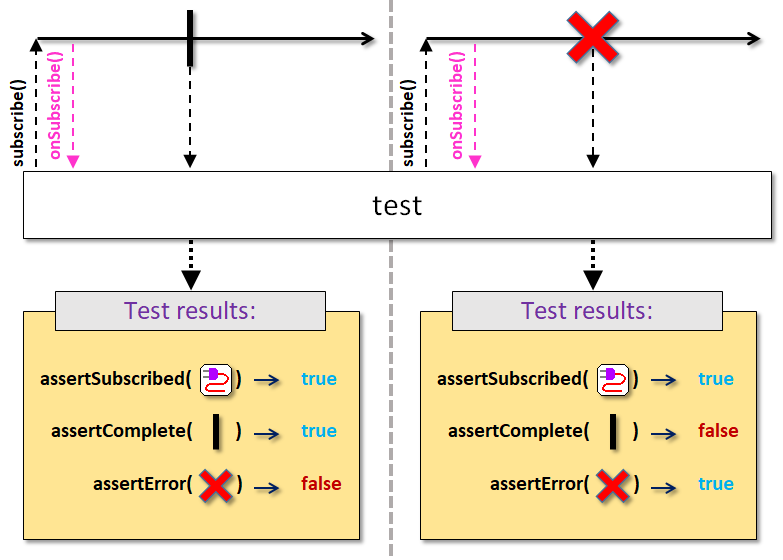
- Scheduler:
testdoes not operate by default on a particularScheduler.
- Returns:
- the new TestObserver instance
- Since:
- 2.0
-
test
@CheckReturnValue @SchedulerSupport(value="none") @NonNull public final @NonNull TestObserver<Void> test(boolean dispose)
Creates a TestObserver optionally in cancelled state, then subscribes it to this Completable.- Parameters:
dispose- if true, the TestObserver will be cancelled before subscribing to this Completable.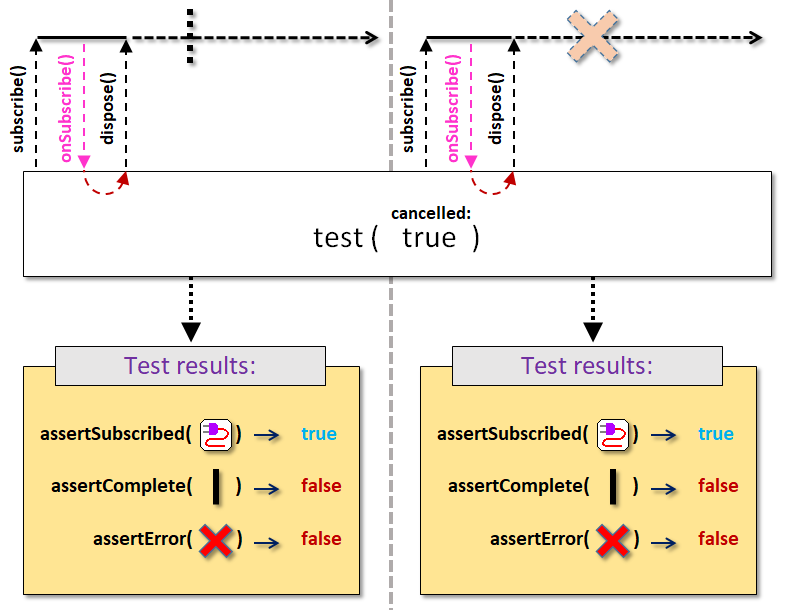
- Scheduler:
testdoes not operate by default on a particularScheduler.
- Returns:
- the new TestObserver instance
- Since:
- 2.0
-
fromCompletionStage
@CheckReturnValue @SchedulerSupport(value="none") @NonNull public static @NonNull Completable fromCompletionStage(@NonNull @NonNull CompletionStage<?> stage)
Signals completion (or error) when theCompletionStageterminates.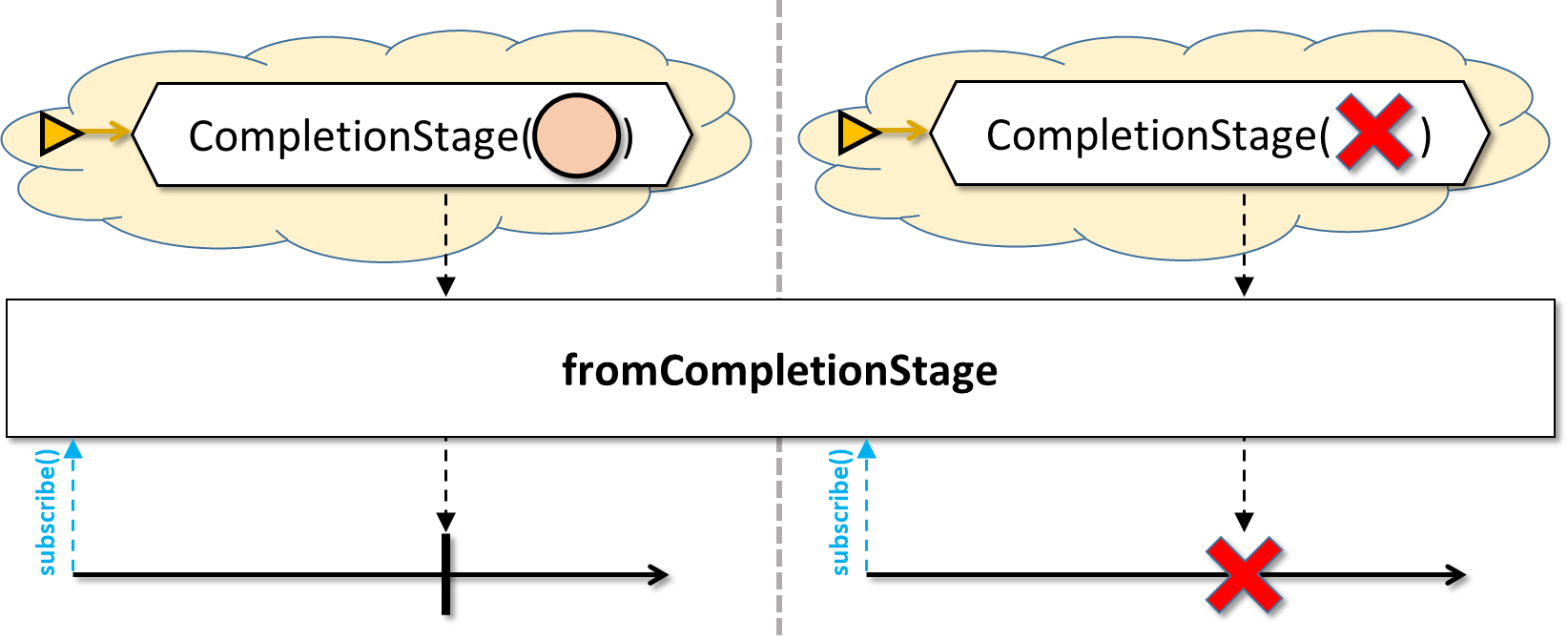
Note that the operator takes an already instantiated, running or terminated
CompletionStage. If the optional is to be created per consumer upon subscription, usedefer(Supplier)aroundfromCompletionStage:Maybe.defer(() -> Completable.fromCompletionStage(createCompletionStage()));Canceling the flow can't cancel the execution of the
CompletionStagebecauseCompletionStageitself doesn't support cancellation. Instead, the operator detaches from theCompletionStage.- Scheduler:
fromCompletionStagedoes not operate by default on a particularScheduler.
- Parameters:
stage- the CompletionStage to convert to Maybe and signal its terminal value or error- Returns:
- the new Completable instance
- Since:
- 3.0.0
-
toCompletionStage
@CheckReturnValue @SchedulerSupport(value="none") @NonNull public final <T> @NonNull CompletionStage<T> toCompletionStage(@Nullable T defaultItem)
Signals the given default item when the upstream completes or signals the upstream error via aCompletionStage.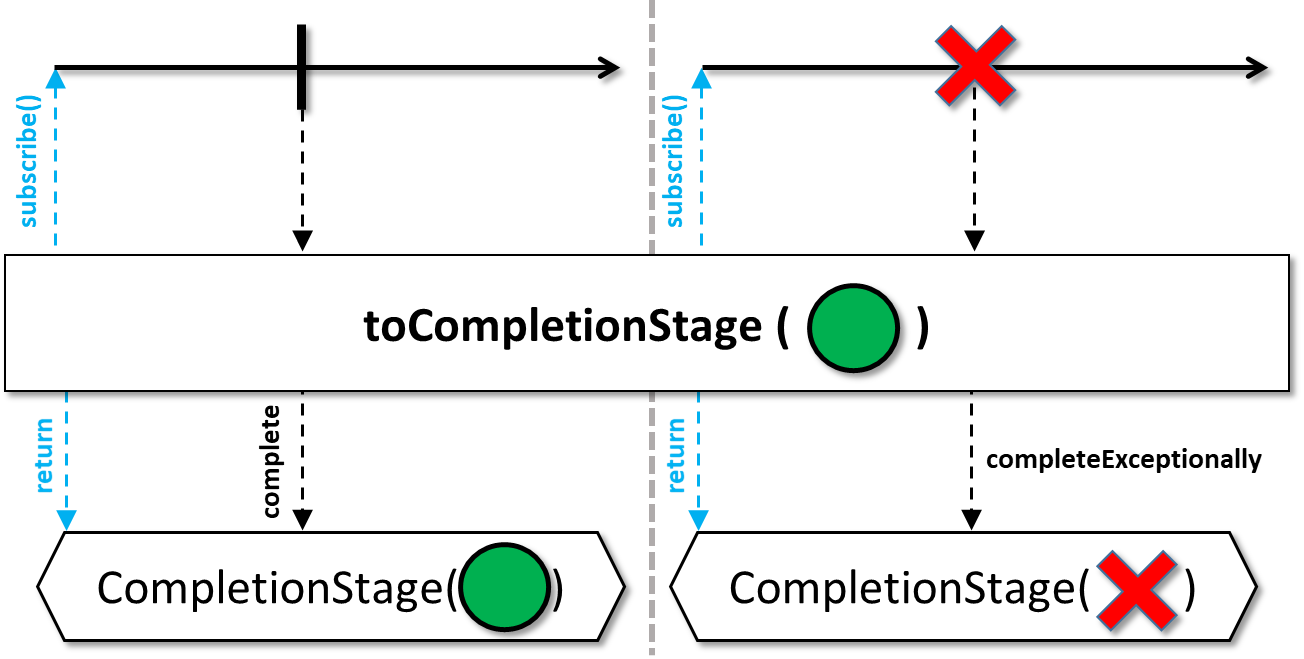
The upstream can be canceled by converting the resulting
CompletionStageintoCompletableFutureviaCompletionStage.toCompletableFuture()and callingCompletableFuture.cancel(boolean)on it. The upstream will be also cancelled if the resultingCompletionStageis converted to and completed manually byCompletableFuture.complete(Object)orCompletableFuture.completeExceptionally(Throwable).CompletionStages don't have a notion of emptiness and allownulls, therefore, one can either use adefaultItemofnullor turn the flow into a sequence ofOptionals and default toOptional.empty():CompletionStage<Optional<T>> stage = source.map(Optional::of).toCompletionStage(Optional.empty());- Scheduler:
toCompletionStagedoes not operate by default on a particularScheduler.
- Type Parameters:
T- the type of the default item to signal upon completion- Parameters:
defaultItem- the item to signal if the upstream is empty- Returns:
- the new CompletionStage instance
- Since:
- 3.0.0
-
-